#Common Winter Pests
Explore tagged Tumblr posts
Text
0 notes
Text


Just dropping some illustrations of animals that I've only mentioned in passing (mostly in regional food posts), found within claimed Imperial Wardi territory.
Left to right (all to scale):
Grynaig, crested eagle, taarn, unkata, piispiispi, anara, nechoi.
Descriptions below:
The grynaig, a type of pigeon found primarily in the highlands. They come in a few local color morphs, ranging from this brown-white to a chestnut color (mostly dependent on the types of rocks they nest upon). They nest on the tops and sides of boulders and cliffs, out of reach from most ground-based predators and camouflaged from predatory birds above. They are commonly hunted for food, and are regarded as having beautiful calls.
The crested eagle, found widely across the region. They are specialized predators of snakes and will readily attack highly venomous species, having thick-skinned, pebbly textured legs as defense against bites. They will also take other reptiles, and occasionally prey on small birds and mammals. Among the peoples of the highlands, widespread belief holds these to be (one of many) birds that ancestors will send or take the form of in order to provide guidance and give omens to the living. Crested eagles are often an omen of hidden danger, be it a figurative or literal snake in the grass.
The taarn, a pheasant native to the highlands and domesticated for meat and eggs. The domestic stock has several color morphs and a few distinct breeds, a wild male taarn is pictured here. Wild taarn can be found in high altitudes in the warm dry season, and migrate down to the river valleys in the cold wet season. Taarn form the vast majority of captive fowl in the highlands, being the most tolerant of cooler, high altitude conditions. Males possess sharp spurs, and are used regionally for cockfighting. Cockfighting is also popular in parts of the Imperial Wardi cultural sphere and taarn may be exported largely for this purpose, being imagined as uniquely fierce, having been shaped by their hostile environment (in reality, they don't tend to fare well against the common rooster).
The unkata, a genus of large flightless birds. Several species can be found in the region, all of which are flightless and relatively large. The one here is a male savannah unkata in breeding plumage (about the size of a cassowary). Male unkata often have colorful wings, and all possess long, unfeathered quills. The wings are shaken as a part of courtship displays, creating a rattling sound and dazzling visual effect. These birds are herbivores and feed on grass, leaves, tender shoots, and fruit, but will consume insects and small mammals/reptiles when the opportunity presents itself. Most unkata are commonly hunted as wild game, and their large eggs are often prized as food and used for carving.
The piispiispi, named for its devastatingly silly warning cries (the sound is a shrill PeEEESSsss-PeEEESSsss-PIPIPIPIPI!). This is a fairly large and stocky lagomorph that lives only in the highlands and almost exclusively at high altitudes (with rabbits filling their niches in the river valleys). They subsist primarily on grasses, and are known agricultural pests. They pack on substantial weight prior to the winters (which is the best time to hunt them for rich, fatty meat), but do not truly hibernate, instead alternating between periods of low activity in their burrows and emerging to graze (the winters here are relatively warm, and snow cover is often patchy or impermanent at all but the highest altitudes).
The anara, a genus of large semi-aquatic rodent. Two species can be found in the region (the larger of which is shown here, both look very similar) and can be found throughout in most rivers, lakes, ponds, and wetlands. Their tail is flattened vertically and used to propel them through water, though they retain (relatively) long legs, as they spend much of their time foraging on land, usually staying within a couple hundred feet of water. They are considered agricultural pests, and are commonly hunted for pest control and their meat (particularly the tail, which is uniquely rich and fatty).
They construct small lodges along banks for shelter in a similar capacity to beavers. They do not build dams, but dig canals to connect bodies of water (for ease of movement and to flee from predators). These canals are often expanded by the comings and goings of an-nechoi, and together the two species are of key ecological significance to their environments, vastly expanding the size of wetlands and the reach of seasonal floods. The two species also seem to get along quite well (especially given the notoriously bad temper of an-nechoi, and the bite-sized nature of anara), often peacefully sharing the same habitats in close quarters. Young anara are sometimes even seen resting on the backs of submerged an-nechoi. This connection is widely noted, and a subject of many regional animal folktales.
Nechoi, a family of pig-like opportunistic omnivores. The one pictured here is a scrub nechoi, one of the larger in the region (though dwarved by their somewhat distant, semi-aquatic an-nechoi relatives). These are the most widespread and generalized, and fare well in dry environments (mostly being found in the grasslands and savannahs). The skin of this species is exposed (though they bear a dense mane and thick, wiry hairs throughout), and they will coat themselves in mud and dust to protect against the sun and parasites. This particular species bears impressive tusks in the boars, and smaller tusks in the sows (shown here), and they are often hunted for their ivory.
Most nechoi bear very powerful jaws with a wide gape, and boars will fight over territory and mates by yawning and slashing at each other with their sharp teeth. These conflicts result in a scarred appearance in most older boars, and can sometimes be fatal. As with most nechoi, these animals feed primarily as browsers, but will readily scavenge and may opportunistically take live prey, mostly arthropods and small vertebrates. Predatory attacks on animals bigger than they can fit into their mouths are rare, but larger nechoi such as these are considered dangerous, and may readily eat humans injured or killed in territorial or defensive aggression. These more dangerous nechoi are sometimes subjects to taboos against eating the flesh of man-eaters, though smaller nechoi are common game animals.
#creatures#I have not decided if pigs exist in this universe or not. I've mentioned them before (I think just as 'hogs') but they may or may#not be domesticated and/or smallish species of nechoi#We'll see
293 notes
·
View notes
Text

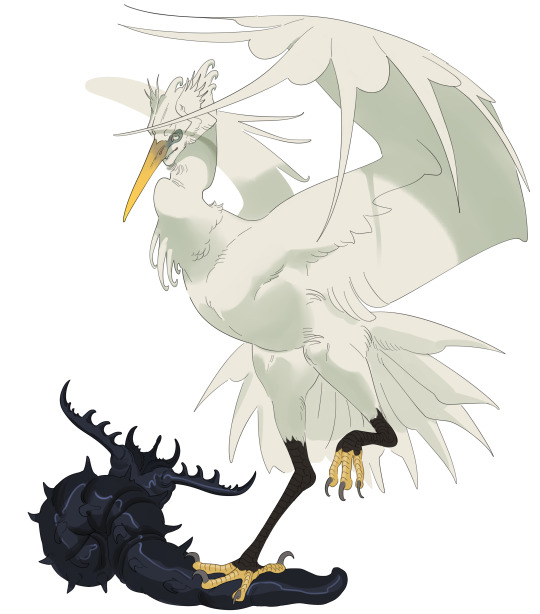
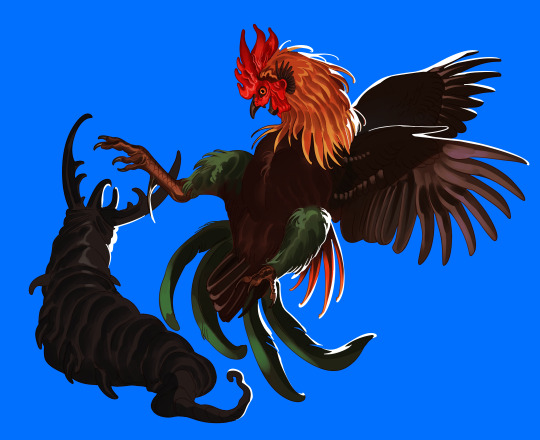
so what exactly is a 'crawling beast of the earth' and why did harpies have to develop such extreme modifications just to defend against them?
nobody really knows what the crawling beasts are except the wyrms, and they're not telling anyone. the beasts take many forms but commonly they are eyeless and worm-like with large jaws but no mouths. they do not eat, they show no signs of intelligence, and it seems that all they do is crawl and bite. their bodies have a high heavy metal content and by their very presence they leach toxic waste into the earth around their burrows that destroys organic life. although nobody really knows what they are or where they came from, it's universally acknowledged that crawling beasts are not monsters or natural animals. monsters - not animals - are able to physically touch a crawling beast without being poisoned and you can kill one by ripping it to shreds, but the easiest way to kill one is to throw their bodies on a pyre.
in terms of behaviour they seem to show no response to injury or environmental stimulus but always crawl or burrow towards the highest concentration of large living creatures they can sense (through means unknown). if one gets within biting distance they will bite.. even if there's a layer of topsoil between you and them. they do not notice others of their own kind and can mindlessly form huge aggregations underneath villages or settlements, fouling one another until eventually the sheer volume and mass of the pile-up spills onto the surface.
the purpose of the beasties, in this setting, is to provide a common enemy that can be a catalyst for human and monster cooperation. they're kind of a macguffin that makes everything else happen, but i like them because they're undefined and terrifying for everybody. one big crawler will destroy a field of crops in one night and make the soil barren, and that can be the difference between making it through the winter and starving, in a small village. crawlers are the reason flighted harpies fear touching the ground. the whole land is infested with them (the sea, too) and their numbers are only growing.
for most harpies, attaining the size and strength (and talons) necessary to fight a crawling beast would reduce their ability to neatly and accurately forage or hunt their normal animal prey. so instead of everyone developing this weaponry, instead only one guy in a flock does, and thereafter he's the flock's bodyguard. kings suck at hunting and foraging. because even regular eagle harpies are naturally pretty big and pointy, they are the first choice for human falconers who want a partner who can swoop down, snatch up a crawling beast, and drop it on a fire. solitary monsters fare the best here since they usually don't attract any crawling beasties, except when they're pressganged by humans (or other monsters) into helping the general pest control effort.
only wyrms are known to hunt and eat crawling beasts.
#ice storm over kosa#normal earth. then one day bam here's the crawling beasts. and THEN monsters happened#more on that later
264 notes
·
View notes
Text
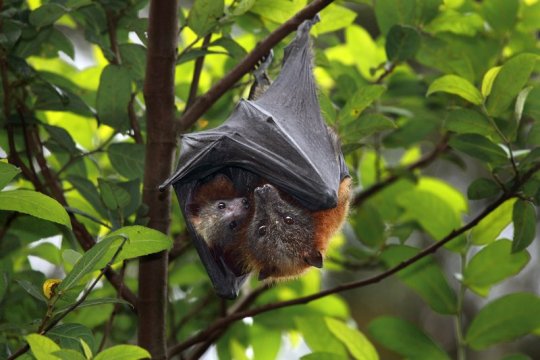
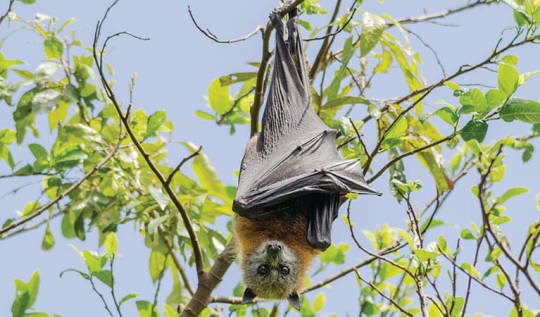
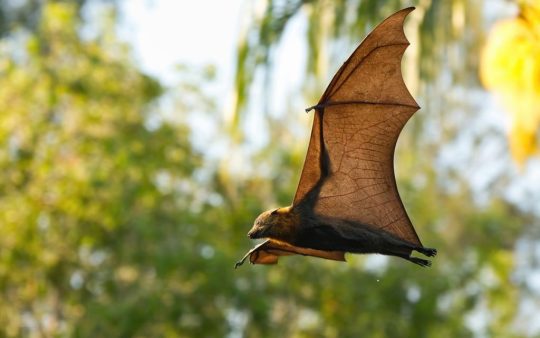
Get Foxy with the Grey-headed Flying Fox
Pteropus poliocephalus, better known as grey-headed flying foxes, are a species of megabat native to eastern Australia. They are typically found in rainforests, woodlands, and swamps, but they have also become common in more agricultural and urban areas, particularly those that maintain large groves of trees. They are semi-migratory, moving when food availability diminishes, and can travel over 1000 km (620 mi) over the course of a season.
Like most bats, grey-headed flying foxes forage at night. They feed exclusively on fruit, pollen, nectar, and tree bark-- most commonly from figs and two species of eucalyptus tree-- and may fly up to 50 km (31 mi) in a single night to find food. Although they are quite large, P. poliocephalus can fall prey to eagles, goannas and snakes, particularly as pups or juveniles.
Because they do not feed on insects, these bats do not use echolocation to navigate. Instead, they use a large range of calls to communicate with other members of their colony, which can contain several hundred members in the summer. Winter colonies are slightly smaller, and segregated by sex, but individuals and families within these groups will stay together for several generations.
Mating occurs between March and May, when males stake out territories and compete to attract females. After mating, mothers seclude themselves in a female-only colony and gestate a singe pup about 6 months after breeding. Weaning takes an additional 5-6 months, after which juveniles separate from their mother. Daughters typically stay within their mother's winter colony, while sons join the male colony after a year's time. Individuals take approximately 30 months to become fully mature, and may live up to 10 years in the wild.
The grey-headed flying fox is notable for being the largest of Australia's bat species. Adults can be anywhere from 600-1000 g (21.5- 35.2 oz), with a wingspan of up to 1 m (3.3 ft). As their name implies, the body is covered with burnt orange fur, and the face is large and fox-like, with none of the large ears or distinct nasal apparatuses that distinguish other bat species.
Conservation status: P. poliocephalus is considered Vulnerable by the IUCN. Populations are declining largely due to habitat destruction. Many individuals are also killed by farmers, who consider them to be pests.
Photos
Vivien Jones
Shane Ruming
Andrew Mercer
#grey-headed flying fox#Chiroptera#Pteropodidae#fruit bats#flying foxes#bats#mammals#tropical forests#tropical forest mammals#tropical rainforests#tropical rainforest mammals#deciduous forests#deciduous forest mammals#urban fauna#urban mammals#oceania#australia#east australia#biology#zoology#ecology#animal facts
74 notes
·
View notes
Text
it's (a little overdue but still) time to...
✨️ plant garlic ✨️
good news is with garlic's extremely long growing season, there is a lot of buffer to when you can plant your garlic. october through december, actually - as long as it's a few weeks before your first frost. BUT, a long buffer also means a lot to do to prep for it and a longer time to keep them happy. so let's break down how to keep garlic fed for the next few months.
🧄 step 1: compost

because of garlic's long growing period, it makes them heavy feeders of nutrients. along this growing journey will be many steps to giving them fresh nutrients, but step one is making sure they get a small but steady supply as they grow. wherever you plan to plant the garlic, top it off with a small compost lasagna. since this is an established bed (my oldest bed, actually) i kept my compost lasagna ratio a little on the lightsr weight side-of-things. very thin layer of tree mulch on top of the old soil, kinda mixed in even. then a layer of green (i took the sweet potato vines as i harvested the potatoes in the bed next to this one) and waited about 2 weeks to let them de-moisturize and also because of health reasons but whatever. on top of that, i added a mix of green and brown grass cuttings, some fallen leaves thrown in there too. this was the thickest layer at about 3 inches. the penultimate layer is about 2ish inches of a mix of old soil and peat moss. after planting the bulbs, i added the thinnest layer of leaf mulch, but this is not necessary. the only reason i added this last layer is because we have been going through a prolonged drought, so i wanted a layer that will keep that soil moist as long as possible.
🧄 step 2: fertilizer soup
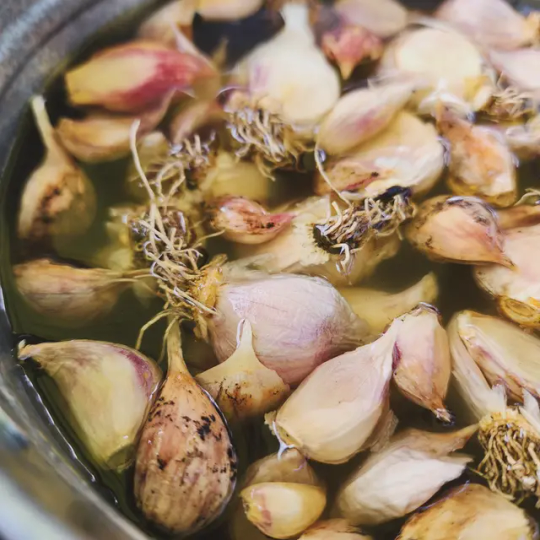
now for me, fertilizer soup is a diluted fish emulsion solution. that's it, mostly because i am lazy and also because it's the most common method. @gardening-guy is trying out a banana peel fertilizer soup when they started their garlic (oli got the bulbs from my shop, so tbh only difference so far is the fertilizer soup recipe. and oli started a month ago. not a competition.) oli's garlic has already started to pop up, so that means the fertilizer soup did it's job - penetrate the tough outer skin the garlic bulbs got when curing and gave them a burst of energy to get things growing. let me know if you use a different fertilizer soup recipe. as long as it's high in potassium, you'll be good to go. oh, and make sure it soaks for 24 hours. that cured skin is pretty thick.
🧄 step 3: companion planting

while garlic is a heavy feeder, that doesn't mean they're introverts. a lot of websites will tell you garlic deters pests from other plants, but legit for real right now go out to your garden and tell me if you smell garlic once it's planted. you don't, and the bugs sure don't. so ignore that part and plant winter vegetables alongside your garlic that wants nitrogen AND grows above the soil line. garlic wants all the potassium, and you don't want to disturb the garlic bulbs under the soil line. winter vegetables you can harvest by cutting are the best. i have pink celery that i am btoh harvesting and letting go to seed in one bed, so no disturbance there. this bed i seeded with all the viola seeds i have hoarded over the years alongside beets i am letting go to seed. beets are NOT the best companions if you are going to harvest, but since i am using them as seeders then it is fine. i haven't figured out what the companion plant will be in the third garlic bed, but other choices are lettuce, cabbages, collards, broccoli, kale... anything leafy, really.
ok, remember when i said make sure the companions are ones where you can harvest above the soil line?? it's because once you do so, those roots left behind will decompose and give the garlic another slow feeding of potassium! the plant gobbled up all the nitrogen, and because their roots are relatively thin they are quick to compost and add potassium back into the soil. crazy, eh??
🧄 final step: waiting


and honestly... this is the hardest step. especially for me, the world's most impatient farmer. but the good news is that while you wait there are two more key points of when to refeed your garlic:
between bits of heavy frost - typically around end of january or february - water the garlic with a ton of that fertilizer soup recipe you used before. the bulbing hasn't started yet, but this will keep those roots growing despite the soil temperature. and if you are more up north than me, add a thick layer of mulch or straw to help keep that soil temperature from going too far past freezing.
the last time you'll want to feed your garlic will be the end of winter. this is when the garlic bulbs really begin to bulbate... bulbge? bulb out?? none of that sounds right... either waaaaay. to get the biggest bulbs possible, you want to give them the highest dosage if potassium possible - and that's in the form of ✨️potash✨️ which... turns out to be just a fancy word for wood ash. burn some wood in a fireplace or firepit, burn your unpaid medical bills, burn your student loan reminders, burn anything that is paper or wood. don't mix with anything else, and REALLY DO NOT use the leftover charcoal from a grill. this potash needs to be as pure to potassium as possible. so no burning your yaoi/yuri mangas to hide from your partner, either.

and before you know it... those 3/4lb of garlic bulbs you started with turn into 5lbs of garlic. we shall meet again next year around april or may to discuss ✨️ the curing of garlic for long-term storage ✨️ until then, happy winter!
#food not lawns#gardening#home garden#homegrown#gardenblr#grow food#food#homestead#homesteading#nature#garlic#growing garlic#suburbia farming#suburbian agriculture#suburban agriculture#suburban farm
28 notes
·
View notes
Text
Moth of the Week
Bird-Cherry Ermine
Yponomeuta evonymella
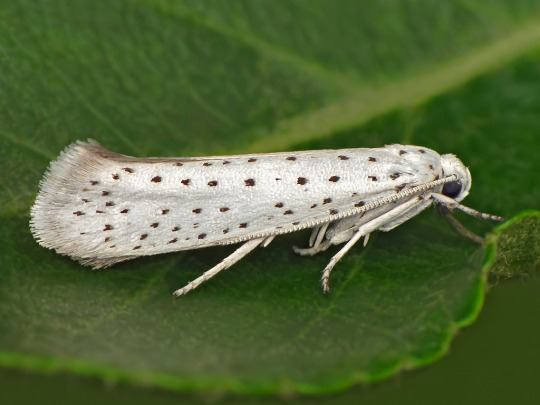
Image source
The bird-cherry ermine is a part of the family Yponomeutidae, the ermine moths. It was first described in 1758 by Carl Linnaeus. It was originally placed in the genus Phalaena but was later transferred to the genus Yponomeuta, becoming Yponomeuta evonymella. This species’ common name comes from their main food plant: Bird Cherry.
Description This moth has a white thorax, head, and forewings. The forewings have five horizontal lines of small black dots, and a few black dots are also on the back of the thorax. The hindwings are shorter and wider than the forewings and are a beige/light brown color. Both the forewings and hindwings have a fringe on the end however, the forewings�� white fringe is short and only on the outer margin while the hindwings’ brown fringe is all over the hindwings’ edges besides the parts touching the forewings. Additionally the hindwings’ fringe is longer on the bottom of the wing. This moth’s thin and wiry antennae are two thirds the length of the forewing and are usually white.
Wingspan Range: 16 - 25 mm (≈0.63 - 0.98 in)
Diet and Habitat This species’ caterpillars mainly feeds on Bird Cherry (Prunus padus), but they also occasionally feed on cherry (Prunus) or buckthorn (Rhamnus). They are known to sometimes be pests of the bird-cheery because the caterpillars pupate and feed together in web like nests that can cover whole trees. This web keeps them protected and allows them to eat mostly unbothered by other insects and predators. The tree is still likely to survive after this, but may grow less in the following growth season/spring. Adults feed on nectar.
This species can be found in Europe and the northern and eastern parts of Asia. They live in many habitats such as river lowlands, deciduous forests, alluvial forests, stream banks with bushes and trees, gardens, parks, and more. Strangely according to Butterfly Conservation, this moth can be found “often far from the known foodplant.”
Mating This moth is seen in June to September and has only gerarion per year. Females let their eggs on the winter buds of their food plants.
Population sizes fluctuate, but it’s not uncommon for mass outbreaks of caterpillars to happen, which results in defoliated trees.
Predators This species is preyed on by parasitic wasps and seems to have few other predators.
Fun Fact This moth is attracted to light. Additionally when disturbed, this moth can skip away and falls to the ground. Note: this second fact does not currently have a citation on Wikipedia so it may be disproven in the future.
(Source: Wikipedia, Butterfly Conservation)
#libraryofmoths#animals#bugs#facts#insects#moth#lepidoptera#mothoftheweek#Yponomeuta evonymella#bird-cherry ermine#Yponomeuta
112 notes
·
View notes
Text




Calathea ornata
Information:
Common Name: Pinstripe plant, pinstripe calathea Botanical Name: Goeppertia ornata (formerly Calathea ornata) Family: Marantaceae Calathea ornata, also known as the pinstripe plant, is a tropical houseplant and is considered one of the most elegant types of calatheas. It's known for its wide, pointed dark green leaves marked with sets of thin stripes in creamy white or pink. The pinstripe plant grows best in bright, indirect light, moist soil, temperatures between 65 to 85 degrees Fahrenheit, and high humidity.
Tips to Care and Maintain Calathea ornata:
Give this plant adequate bright light to thrive.
Water the plant regularly so the soil stays lightly moist but not soggy.
Use a peat-based potting soil
Fertilize monthly throughout the growing season.
Light: Give your Calathea ornata medium to bright indirect light. This plant is a great option for a north-, east-, or west-facing window; the harsh direct light of a south-facing window can be too strong.
Soil: Calathea ornata will grow best in a loose, well-draining potting mix that holds onto moisture. A peat-based mix is ideal—you can make your own by combining 2 parts peat moss, 2 parts orchid bark, 2 parts perlite, and 1 part organic compost. Some growers prefer to use a ready-made potting mix designed for African violets for their calatheas.
Water: Water your Calathea ornata consistently so that the soil stays moist but not soggy. Overwatering can cause root rot, which can kill the plant. Avoid letting the soil dry out beyond the top inch or so between waterings.
Temperature and Humidity: Keep this tropical plant in a place with moderate temperatures and lots of humidity. If your space is particularly dry, group your plant in with other plants in your collection to help create a more humid microclimate, or run a humidifier nearby to add moisture to the air.
Fertilizer: Feed your Calathea ornata with an organic liquid houseplant fertilizer diluted to half strength every two weeks during spring and summer. Stop fertilizing in the fall, when the plant goes dormant for the winter. Resume fertilizing the following spring.
Pruning: Use sharp, sterilized shears or scissors to cut away any brown or shriveled leaves at the base to keep your Calathea ornata looking healthy. You can also trim away any browned or dried-out leaf margins while leaving the rest of the leaf on the plant. Take care not to cut away more than about a third of your plant's leaves to avoid damaging its growth.
How to Treat Pests
Calathea ornata generally isn't prone to many issues but it can be affected by houseplant pests like spider mites, thrips, whiteflies, and scale. The best way to avoid pests is to prevent them with a few best practices: Examine plants carefully for signs of pests before buying, quarantine plants that show signs of an infestation, and keep an eye on your plants to spot pests and eliminate them early. Treat insect pests with organic pesticides like neem oil��or remove them with horticultural soap. Cut away badly affected portions of the plant, bag them up, and put them in the trash outside to keep them from affecting your other plants.
Common Problems With Calathea Ornata
Calatheas aren't the easiest houseplants to please, but most issues can be remedied by adjusting the plant's environmental conditions or watering more consistently. Here are some common problems with Calathea ornata and their causes.
Curling Leaves: Curling leaves are your plant's way of telling you it needs a drink. If your plant's leaves are curling, give it a good soaking. Keep an eye on the soil moisture to avoid drying out.
Leaves Turning Brown: Browning leaves can indicate a few different issues, including cold drafts, dry air, or too much sun. Consider your plant's conditions and make adjustments.
Leaves Turning Yellow: Yellowing leaves can mean your plant is getting too much water. In severe cases, they can be a sign of root rot. Cut back on watering immediately. If that doesn't help, repot your plant in fresh soil and cut away any black, rotten roots in the process.
#plantblr#plantcore#plant blog#naturecore#nature#plant photography#plants#plantbased#calathea ornata#botany#studyblr#biology#leaves#stripes#writerscommunity#spilled ink#dark academia#light academia#writers on tumblr#information#informative#shitpost#green#home decor#organic#photographers on tumblr#beautiful photos#photoblog#photooftheday#photography
24 notes
·
View notes
Text
The White Lily Greenhouse - How Would It Work?
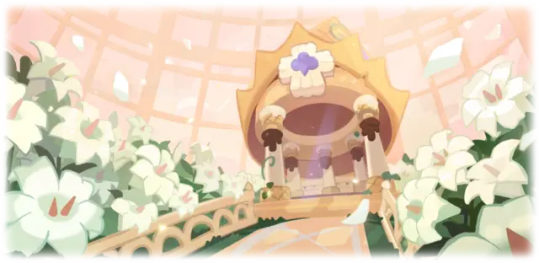
Pure Vanilla Cookie has always been a favorite character to me because of his hobby of gardening. As someone who gardens as well as studies horticulture, it’s fun to see all of the gardens and plants he has in the story. The most notable example for me is the White Lily Greenhouse because it plays such an important role in Pure Vanilla’s character and story. He built it as a place to relax and to enjoy the white lilies he loves so much. But it made me wonder, how in the world would he manage it? Realistically it would take a lot of effort, and considering it's a private greenhouse within his castle, Pure Vanilla would most likely take care of it all alone.
Before I get into anything, I wanted to talk about the specific type of lilies that Pure Vanilla grows. The character White Lily Cookie is based on lilies in general, but most significantly the Madonna Lily. However, I couldn’t find much information about growing Madonna Lilies (Lilium candidum) in greenhouses specifically, so most of the information I have is from growing Easter Lilies (Lilum longiflorum) or lilies (Genus Lilum) in general in greenhouses. The growing requirements are mostly the same, but might have a few slight differences.
Specific Requirements for Growing Lilies and Greenhouses
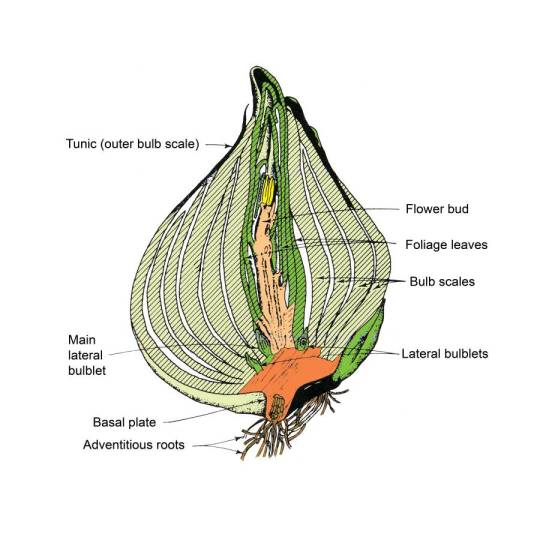
(Diagram of a bulb, image taken from here)
So first, I wanted to explain briefly about the morphology of lilies and how that impacts their management. Most lilies grow from bulbs, which are specialized structures made up of a short fleshy stem enclosed by thick, fleshy leaves. At the bottom of a bulb is the base plate where the stem, leaves, and roots grow from. One way to propagate lilies is through bulblets (also called bulbils), small bulbs that grow from the base plate, which can be removed and planted on their own. However, the most common way is through bulb scales where the first (and sometimes second) outer portion of the leaf scales are removed and planted. But whatever the case, both the bulblets and bulbs scales need to go though some period of cold temperatures to break their dormancy. This means you can plant them in the fall and let them stay over the winter, or you could put them in a refrigerator to chill. Considering the Vanilla Kingdom is in a mountainous region and high up in the sky, I’m sure they can be put outside before transferring them to the greenhouse.
Heating and lighting are two important factors in making lilies grow well. Lilies need full sun, which is about 6 hours per day. Generally a south facing greenhouse will have more light exposure, otherwise you may need artificial lighting. Lilies will start growing when temperatures are warm enough, so greenhouses usually aim for 60 F, but they can also grow well up to 75 F. I'll discuss how heating and lighting might work for the white lily greenhouse.
Although lilies are perennials and bloom year after year if you maintain them, most ornamental gardens will plant new bulbs every year because old bulbs won’t produce as much or as big flowers as younger bulbs do. This would mean Pure Vanilla would have to dig up old bulbs and plant new ones every year, unless he has some type of special magic that will make them bloom as big and numerous consistently.
Weeding and pest management are always something to keep in mind with greenhouses, but if you don't let them become a problem then it's pretty easy to deal with. Proper sanitation like removing weeds before they produce seeds, removing plant debris and dead plants, and having clean growing media will all help prevent problems. I think Pure Vanilla is vigilant enough to do all of that.
Historical Greenhouses
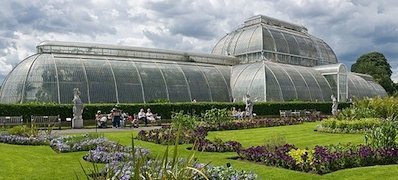
(A classic greenhouse from England, image taken from here)
In the past, greenhouses were heated just by the sun or with additional heating like furnaces, hot water, or steam. This meant that temperature control was not very precise and had to be fiddled with in order for the greenhouse to be properly heated. If this was the case, I think there would have been some type of boiler specifically for the greenhouse situated at a higher elevation so that the hot water/steam could be carried by gravity into the greenhouse. Water for irrigation had to be brought in unless you had a nearby water pump. Carrying water in would have taken a lot of effort, not to mention that you would have to do watering by hand, which would have been tedious for one person. However, I doubt that Pure Vanilla would mind with his patient nature and enthusiasm for gardening.
The cost of glass and steel to build the greenhouse itself would have been expensive. But taking into account that Pure Vanilla was a king, he probably didn’t have much trouble with the cost of construction or equipment.
The Vanilla Kingdom is based on Germanic countries, and those countries have a long history of using greenhouses. During the 16th and 17th centuries places like England, France, Italy, and the Netherlands had greenhouses to grow exotic plants that they collected. So the locale and inspiration for the kingdom lines up.
The Modern Approach
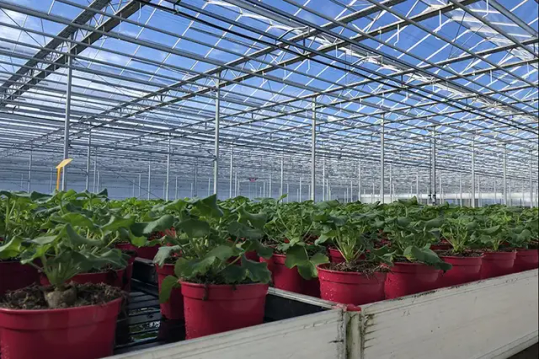
(A modern Dutch style greenhouse, image from here)
Considering the Vanilla Kingdom had the waffle bots and advanced technology, it would be reasonable that Pure Vanilla could have access to more modern greenhouse technology similar to what we have today. Things like automatic misting systems, electrical and gas powered heating, and artificial greenhouse lighting. Not to mention all the sensors and timers that can help automate things. However, I’ve seen greenhouses built pretty recently that still use hot water pipes to heat the greenhouse and manually watering their plants. Seeing that Pure Vanilla is more old fashioned and traditional, he could have also run his greenhouse using old school methods.
Of course, all of this can be hand waved with magic but I like to think that the creation of spells is also considered special techniques that have to be learned and trained. I'm sure that Pure Vanilla or even White Lily Cookie could have developed some type of specialized magic to grow plants easier, similar to how in real life new technology is constantly being developed in order to more efficiently grow plants.
Sources:
https://wyoextension.org/publications/html/B1185R/
#cookie run#cookie run kingdom#pure vanilla cookie#horticulture#I've worked in a 'historical' greenhouse that's nearly a century old#and toured many modern greenhouses#some more technologically advanced than others#so I am interested in greenhouse production but I'm not sure if it's something I want to pursue as a career#but anyways I now have more respect for pure vanilla for managing his own private greenhouse by himself
30 notes
·
View notes
Text
Give 'em Something to Talk About - Ace
Author Notes: My backlog of fics strike again! I actually don't really remember writing this, but I figure it comes from the timeframe where I was practicing writing Ace. And, heads-up, it isn't that I dislike Ace by any means. It's just that I don't actually get fic ideas for him on the fly. I have to actively work to come with an idea for Ace fics and I don't know why. This fic also doesn't have a specific tune I wrote it to (though it amusingly has plenty in common with "Let's Given Them Something to Talk About" by Bonnie Rait). Also, Ace got posted from the backlog because I rolled and Ace SR today (just the ceremonial robes, but hey, I took it as a sign). As per usual, Reader is gender-neutral. I hope you enjoy!
Type: Gender-neutral reader/ fluff/ romance/ flirtation
Word count: 973

It had long been an internal debate you’d had. Who exactly at this school oozed the most trouble?
Was it Floyd? There was certainly risk to be had there, but…. You didn’t know if trouble was the right word to describe him.
You knew who the word did fit, though. All it took was an evil grin accompanied by those sparkling ruby-colored eyes, and you knew exactly what Ace was. Trouble. With a capital T.
And yet, despite this knowledge, you willingly spent time with the menace that was Ace Trappola.
Why? Well, there were a great many reasons for the ‘why’ of your reasons for hanging out with the young man.
For one thing, Ace was charming. That was how he got out of the trouble that he himself so frequently caused. You were confident that Ace could and would talk his way out of most anything, all while sporting a confident grin.
Then there was the fact that Ace was quite loyal. How could you ever deny that when he and Deuce had spent a fair bit of their winter break busing their way to where you were?
The very second you needed aid, Deuce and Ace would be there. The dynamic Heartslabyul duo, who were always by your side. Through thick and thin, for better or worse.
You three were fire-forged friends, but you knew full well that your relationship with Ace was a little different from your relationship with Deuce.
Deuce was your close friend, on whom you could always rely. Despite his delinquent past, he was the gentler one of the two and was always ready to comfort you as needed. Even if he was a little dumb, Deuce was both earnest and sweet. A combo you couldn’t even begin to guard yourself against, so you didn’t bother. Deuce was your dear friend after all.
But then there was Ace. Ever-teasing, flirtatious, and a bit of a pest. It was like bugging you was his favorite way to show his affection.
Affection that he would staunchly deny even as he was wrapping his arm around your waist and tugging you just a little bit closer.
What had started as a friendship with Ace had swelled into what you could only describe as a flirtationship. Neither of you would take it but so far, and then you’d both stop. But that line was slim, and Ace had always liked to dance along the edge of it.
For your part, you frequently played defense. Showing any reaction was largely out of the question if you didn’t want to be teased mercilessly.
You mainly flirted back when Ace left himself open. And his reaction was a glorious one, with him turning the same red color as the heart that decorated his left eye.
But even when flustered, he couldn’t quite bring himself to keep away from you. Oh, he might not spout off quite so many flirtatious remarks, but his physical affection never waned.
If you two were walking somewhere together, he would have an arm around you as he chatted about something that had happened. If you were sitting side by side, his knee would be bumping yours, which was always followed by his eyes darting towards you and a sly grin crossing his face.
His hand finding yours was second nature, as was leaning towards you as he barely lowered his voice to mutter something snarky about someone else in your ear just to see if he could earn himself a brief spout of laughter from you.
Oh yes, Ace was trouble of the sort you saw in films, and you’d always rolled your eyes when the lead lady would inevitably fall for his charms.
But you couldn’t roll your eyes anymore. Not when you were in her shoes.
At first, you’d thought very little about it. But the more Ace pushed, the more you felt your affection growing for him.
Your relationship was a comfortable one, but Ace had never minded pushing the boundaries. And when you’d at long last pushed back… Well, you couldn’t deny that you enjoyed the shocked but pleased smile you’d earned yourself.
Even when Jack was rolling his eyes and Epel was letting out a disgusted-sounding huff, you couldn't deny that Ace had a knack for making you feel giddy.
And that giddiness made you feel like Ace ought to have an alarm that would signal you to his approach.
All other forms of trouble had a warning, so why didn’t he?
“Ace, they’re staring,” You grinned slightly as you started to slip your hand out of his. His eyes followed your gaze, finding the horde of scoffing students staring your way.
Being the center of attention at NRC was seldom a good thing, and yet you seemed to constantly be stumbling into the limelight and drawing attention your way. Perhaps it was a talent of yours, but it hardly seemed like a good one.
Especially since, judging from those looks, there was nothing friendly about those stares.
But if Ace cared, he certainly didn’t show it, grasping your hand almost as soon as it left his and tugging you closer. His head tilted towards yours, cherry eyes glinting in a way that promised nothing good, “What’s new about that? If they want to stare, let ‘em stare.”
You felt yourself smiling slightly, grateful once more for that stubborn streak of Ace’s that always had him meeting challenges head-on.
“And if they want to talk, let’s give ‘em something to talk about,” Your smile had slipped into a full-blown grin as you shoulder-bumped the young man, and you treaded ever closer to crossing that line known as friendship and crossing the gap into a completely different relationship.
Ace might be trouble, but he’d always called you danger-prone. And who were you to disappoint?
#Twisted wonderland x reader#Ace x reader#Ace Trappola#briarvalleyarchives#Twisted wonderland#twst#Twisted wonderland imagines#Ace x you#Ace x y/n#Twisted wonderland x you#Twisted wonderland x y/n#twst x reader#twst x you#twst x y/n#gender neutral reader#fluff#romance#flirtation#mywritings#fanfiction#Disney TW#disney twst#Heartslabyul#flirting#Because ace is a flirt
95 notes
·
View notes
Text
I went to the forest today. It's the warmest we had this year, and I needed to get more soil for my baby plants.
Few minutes in, I realized that the heel of my sock has developed a hole, and my foot was now chafing against the rubber boot I was walking in. Which is mortifying, it meant by the time I'd be home, I would have a wound on my heel.
But then I thought, wait a minute, I'm a woman in the forest, I have to be more resourceful than that. So I started grabbing moss and shoving it inside of my sock, in order to make a soft protective layer on my heel. It didn't work exactly as I hoped, the moss didn't stay where I put it, but I kept putting in more and it immobilized the boot so it couldn't chafe against me.
I also forgot to take the moss out of my sock, so I am the rare tumblr user to be actively touching moss while blogging.
I saw a lot of butterflies in the forest! Over 20 of them, it made me wonder if they accidentally got born too soon. Most of them were plain yellow ones, and they would not let me take a picture, no matter how many I followed, they never land. This orange one was patient enough to let me snap a pic!
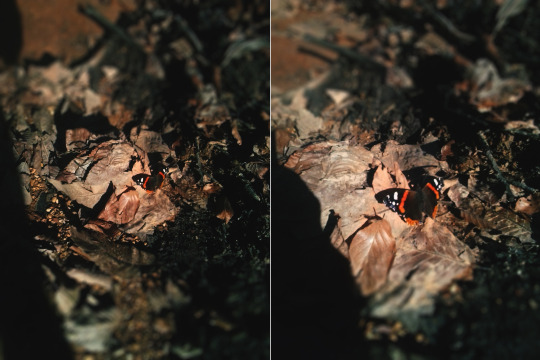
I wonder what they're all eating in the forest, there was about 5 crocuses I found, but other than that, no flowers! There are dandelions and daisies outside the forest though, so possibly they're finding those.
I looked up the orange butterfly, and it's named Vanessa Atlanta, and they're cool to be out during winter! They can hibernate, migrate, they are happy to feed on nettle and dead nettle, and that's available in winter as well. Relieved to know that she's safe!
It was a bit harder to figure out the yellow butterfly, but it's most likely a common brimstone, and they can also hibernate and feed on evergreen foliage during winter. They even feed on holly!
I also found a cool ass birch tree:
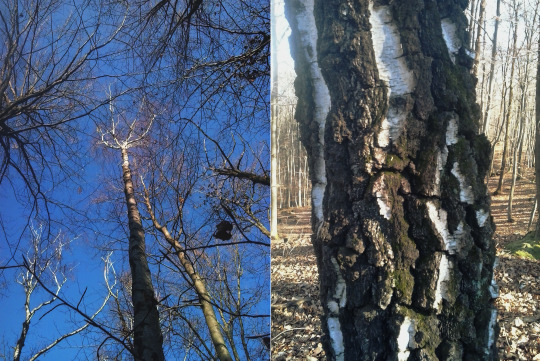
I have recorded in my brain that birches are medicinal for something, forgot for what, but the point is, now I know where to find a birch, so when I connect it all together I will benefit from this knowledge. I think the bark is great for starting fires.
The forest I go in is super versatile! At first I thought it was just beech-chestnut-hornbeam, but then I discovered there's a good amount of oaks as well, and now there's birches too. That is very healthy for a forest! Forests that only have one or two types of tree are susceptible to pests and diseases, these trees can support each other.
If you've read my other post, you know I found some abandoned plant cuttings, that I suspect might be bayleaf; that is still under questioning, maybe it's bayleaf, maybe it's something poisonous. The point is that I maybe found something to eat :).
Here's the crocuses I saw! They've only come out, it's the first warm and sunny day of 2024.
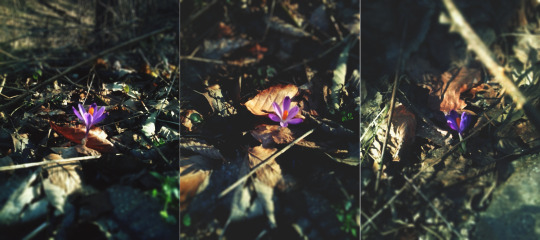
25 notes
·
View notes
Text
Blog 1: Connected to Nature
Hello, ENVS*3000 friends! I'm Maia, and I am in my third year of Biological Sciences. Welcome to my first blog :)
I would describe my current connection with nature as a profound yet carefree essence. I come from the city, more precisely, North Toronto; I found myself yearning for nature's embrace from a young age, perhaps triggered by its scarcity in my urban surroundings. Recognizing my affinity, my dad, a nature enthusiast, actively fueled my passion through camping adventures, hiking escapades, and shared moments immersed in captivating David Attenborough documentaries. In the midst of a large Italian family, where the majority remained indifferent to the natural world, I stood out as the quiet one, the nature lover, aspiring Dr.-to-be. Amidst this, my dad became my reliable support, sharing the same passion for the great outdoors. His passion for wildlife and landscape photography became a shared pursuit, complete with my very own camera.
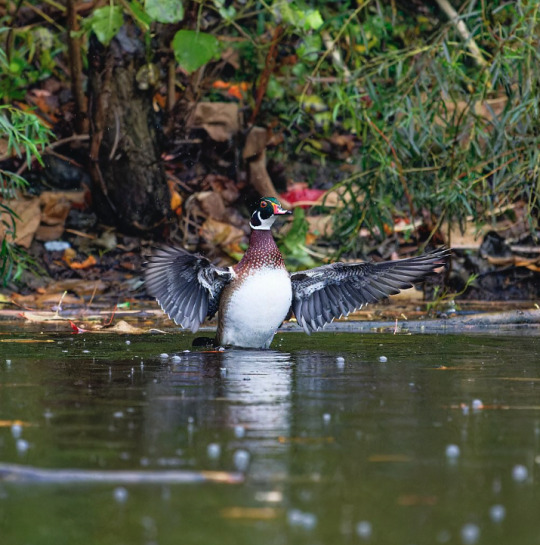
Photo of a male wood duck shot by Dino Melissa
Despite a bustling upbringing as a competitive dancer for 17 years—which is not exactly an outdoor sport—I surrounded myself with nature books, my dad's photographs, and nature documentaries. Unfortunately, while balancing a hectic city life, the opportunities for my dad and I’s outdoor adventures diminished over the years. However, as I am maturing and expanding my knowledge, I continuously discovered new ways to appreciate nature and its interconnected web of life - not mosquitoes though…
In my quest to inspire others to view nature through a similar lens as I do, I spent the past summer at a wildlife hospital, manning the front desk. Handling cases ranging from fallen hawks to orphaned baby raccoons to pigeons with string around their feet, I strived to educate callers about wildlife while debunking misconceptions. Some common ones are that pigeons are dirty and will give us diseases, and snakes are evil - spoiler alert, both are very wrong! While not everyone appreciated or grasped the educational aspect—some mistaking us for pest removal—many left with a newfound understanding of Ontario's wildlife. Small changes, after all, contribute to a broader impact of protecting our native species. This job expanded my knowledge - which I still try to share with anyone who will listen - and played a pivotal role in further evolving my relationship with nature.
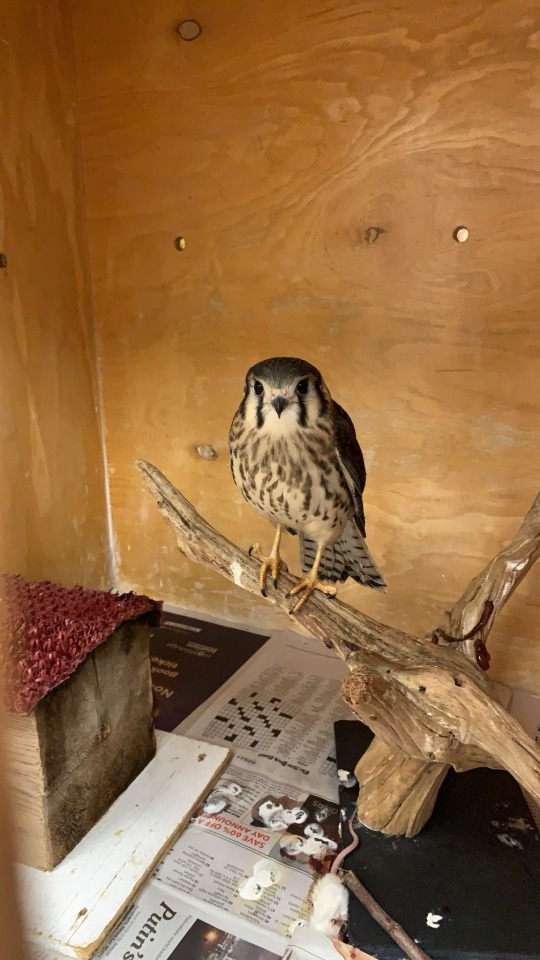
Picture of an American Kestrel
One place that has bestowed upon me a profound sense of place is my cottage—a haven of tranquillity like no other. Nestled on about an acre of land, backing onto a forest, it teems with diverse wildlife such as deer, coyotes, foxes, turkeys, grouse, and a plethora of native plants. Whether quietly observing the tree line or engaging in summer activities like kayaking and hiking, the ambient sounds of water, wind, and nature's symphony create a genuine sense of place; whenever I am there I feel as if I belong there. It's here that I yearn to escape city living permanently, trading it for the allure of a rural plot of land to live off of sustainably.
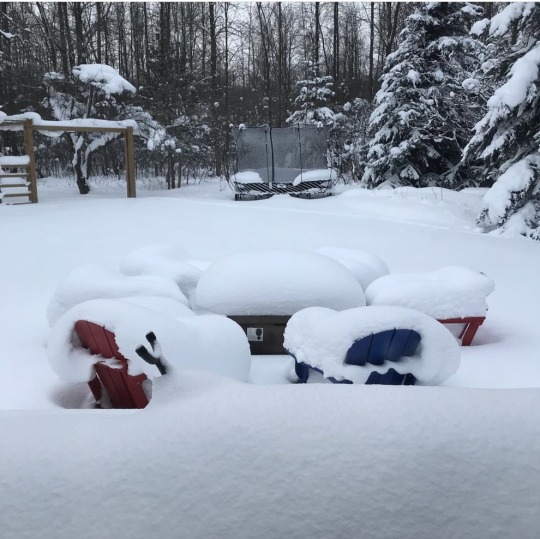
Picture of the backyard during the winter
The dream of owning a small farm and caring for animals has been a lifelong goal of mine. The charm of sustainable living intertwines with my passion for nature; here is where I hope to coexist in harmony. Through responsible practices and a deep connection with nature, I aim to contribute to the preservation of the natural world, all while feeling a permanent sense of place like no other.
21 notes
·
View notes
Text
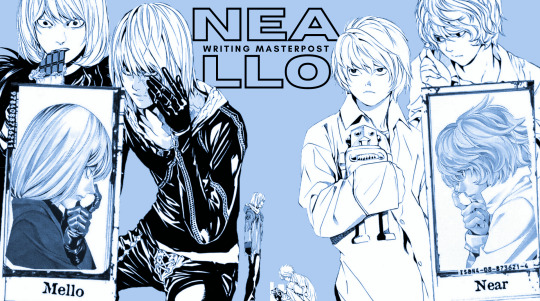
NEALLO / BLONDIEST
WRITING MASTERPOST
ships i have written for:
hellcheer (eddie/chrissy from stranger things season 4)
meronia (mello/near from death note)
this blog is almost entirely SFW, but my writing, which i frequently share on here, does not always fall into that category. minors please do not interact with my mature or explicit fics! you can also find me @neallo
find below a list of fics i have posted, separated by fandom and completion status! (note: hellcheer fics not yet added to this list. also it's really out of date)
death note fanfiction
complete:
hot soup on a cold day
rating: T | category: M/M | chapters: 5/5 | words: 15.6k | series [1/2]
“Roger,” Near says urgently, tapping the old man’s shoulder. “Roger, Mello needs another pillow.” Roger gives Near a questioning look, slight disapproval in his eyes “He’s not making me get him one,” Near clarifies. “Mello is asleep right now. He just doesn’t look comfortable, that’s all.” Roger looks like he’s about to protest, so Near adds— “And I have my mask, so I won’t get sick.” The headmaster sighs, pointing down the hallway towards the linen closet. Near retrieves the perfect pillow— not so old as to be sagging, but not so new as to be overly stiff. Once he props Mello’s head up better, gingerly moving the older boy’s head as he sleeps, he finds Roger again. “I think Mello’s room is too cold. Do you have a space heater I could use?” Roger massages his temples. “Ms. Peterson may have one in her classroom,” he replies / “Very well, I’ll ask her. Thank you, Roger.” The white-haired boy shuffles away, determined. He’s distantly aware that he's being a pest to Roger, but it's all in aid of a good cause. Mello is sick. Mello almost never gets sick, and Near is the expert on being sick, so Near is going to make sure Mello is as comfortable as possible.
hot tea on a cold night
rating: T | category: M/M | chapters: 1/1 | words: 800 | series [2/2]
Mello is half-asleep when it happens. He’s half-asleep, and he thinks Near is totally asleep, but then the younger boy wriggles in his arms, burrowing closer under the covers, and murmurs: “I love you.”
Minutes to Midnight (collaboration with @empressofthewind)
[part 2 of Time Together]
rating: E | category: M/M | chapters: 3/3 | words: 14.8k
This is the only issue Near has with letting Mello do all their debriefings: it’s easy for Near to stare, undetected and uninterrupted, for a long, long time. In New York, he mitigates this by spreading out on the floor and surrounding himself with toys or cards or dice. Whatever he needs to do to occupy himself. When they’ve travelled for cases before – which isn’t common by any stretch of the imagination – Near has relied on the movements and sounds of their colleagues to pull his attention away instead. The squeak of Rester’s chair, the tapping of Gevanni’s polished shoe, the sound of Lidner shuffling through papers. He uses whatever he can to keep his eyes off Mello. Out of sight, out of mind. Right now, he’s out of luck.
it’s you and me, that’s my whole world
[part 1 of together (always)]
rating: T | category: F/F | chapters: 1/1 | words: 3.5k
Once she reaches the first floor and steps out of the elevator, Near hears a voice floating down the hall. It’s a woman’s voice, so it must be Lidner, but the pitch of it and the cadence of speech seems painfully similar to the way Mello talked, even without being able to hear the actual words. The closer she gets, the more it sounds like her dead lover, and Near curses how cruel her mind’s tricks are. She has to grit her teeth and breathe in deep to get herself to push through the door into the main office, feeling almost nauseous with grief again already. A blonde woman in a red winter jacket stands with her back to Near, but she turns when the toy in Near’s hand clatters to the ground. Mello’s eyes are tired, underlined by dark circles, but she grins. “Hey, Near.”
i know i’m gonna lose you (but god, i don’t want to)
[part 2 of together (always)]
rating: E | category: F/F | chapters: 1/1 | words: 3.5k
Near’s bedroom— her tidy little suite in her untidy little makeshift headquarters in a high-rise hotel in Tokyo— is lit only by the shine of the city and the glow of the moon. Because the moon is full and because the city is bright, Mello can see her perfectly. Every little hair on her arms and legs catch the light as she sheds her soft, simple bra. The only thing Mello has taken off so far are her gloves. -- In which Mello rings in 2010 with some good old-fashioned lesbian sex and a minor emotional crisis. prequel to it's you and me, that's my whole world.
there's nothing i want but you
[part 1 of i want to hold you (hostage)]
rating: T | category: M/M | chapters: 1/1 | words: 1.5k
Though Near doesn’t really mind Mello’s tendency towards jealousy, he also doesn’t understand it. There’s no one in the world Near wants the way he wants Mello, no one who matters the way Mello does— he’s everything to Near. There’s no reason for him to feel jealous of anyone else. Near doesn’t get jealous of anyone else. Until, one day, he does.
nothing hurts like you do
[part 2 of i want to hold you (hostage)]
rating: E | category: M/M | chapters: 1/1 | words: 3.8k
Mello shoves him against the wall, his free hand moving from Near’s hair to the center of his chest as he holds the gun just inches from his forehead. He gives Near a once-over, quick, and at first Near thinks he hasn’t noticed anything amiss, but then an unkind smile unfurls on his face. “Hands up,” Mello says, grinning manically.
i want to hold you (hostage)
[part 3 of i want to hold you (hostage)]
rating: E | category: M/M | chapters: 4/4 | words: 21.7k
Rico asks, casual, what Mello will want next, what he’ll aim for after he gets the notebook, and suddenly it’s like the ground has dropped out from underneath him, because the first thing that comes to mind is Near. His stomach sinks as he tries to regain some semblance of composure, fighting off imaginings both tender and cruel, furious with himself for being so weak-minded. Near, he thinks forcefully, is in the past. He isn’t an option for what’s to come— and even if he was, Mello wouldn’t want him. (He wouldn’t.) (He wouldn’t.) (God. He can’t even convince himself anymore.)
my only one, my smoking gun
[part 1 of our love is god]
rating: E | category: M/M | chapters: 4/4 | words: 3.3k
For as long as he can recall, he’s ached over Near. It wasn’t always like this, though; he didn’t realize he wanted Near until it was too late to actually have him. He should be grateful, really, because he’s been able to linger here after death, and that’s more than he deserves, but God, Mello would give anything to kiss him just once.
heaven is a place on earth with you
[part 2 of our love is god]
rating: E | category: M/M | chapters: 1/1 | words: 1.4k
There is no blood or body of Christ, no priest and no pews, but it’s here and now that Mello finally rediscovers a long-lost sliver of faith. Hands on Near’s hips, Mello lowers his face and presses his mouth to Near’s soft abdomen. “I love you,” he murmurs, head bowed and eyes shut as if in prayer.
replication in reverse
[part 3 of our love is god]
rating: E | category: M/M | chapters: 1/1 | words: 1.4k
Mello mumbles something into his neck, something to the effect of waiting until Near is ready for him to move, but Near only halfway registers it. Golden hair tickles his nose, and he pictures mitosis— prophase, metaphase, anaphase, telophase— then imagines cytokinesis in reverse. Two cells pushed together until, somehow, their membranes connect, two phospholipid bilayers self-arranging into one continuous structure, cytoplasms mingling. He swallows thickly and longs for something impossible.
starry eyes sparking up my darkest nights
[part 1 of you got your eyes from the stars]
rating: T | category: F/F | chapters: 1/1 | words: 930
Near has a nightmare on the flight back to New York after the end of the Kira case; Mello, still tipsy off of the red wine they served in first class, is unexpectedly tender.
fireworks somewhere far away
[part 2 of you got your eyes from the stars]
rating: T | category: F/F | chapters: 1/1 | words: 2k
It’s the fourth of July. Or, rather, it’s still the fourth of July in the United States, which is where they live, but they’re in Madrid at the moment, so technically where they are it’s the fifth. It’s not hard math to figure out what time it is back home— it’s a little before six in the morning here, so it’ll be a little before midnight in New York. Somewhere on the West Coast or in the Rocky Mountains, though, there are fireworks going off. That’s what Near is thinking when Mello kisses her for the first time.
engaged
rating: M | category: M/M | chapters: 1/1 | words: 1.4k
“So, like, I suddenly realized… Near is into me. Like, Near wants me.” He pauses as if to allow this to sink in, looking at Matt like this is still a groundbreaking revelation the second time around when it in fact was not even groundbreaking the first. Near’s crush has been obvious to literally everyone but Mello for the past ten years. “Yes. This surprised you. And also me, because I definitely did not know that Near was into you before you told me fifteen minutes ago.” Mello nods, satisfied, entirely missing Matt’s sarcasm, which might be for the best. “So, naturally, I slept with him.” “Naturally,” Matt says. Mello does not miss the sarcasm this time. “If you’re just going to be a judgmental bitch the whole time, I’m not going to explain it again. You should be smart enough to remember what I fucking said the first time anyway.” “No, yeah, I actually think most well-adjusted people would sleep with their sworn enemies the moment they find out they’re into them.” Matt smiles tightly. “It wasn’t the moment I found out,” Mello says petulantly. “I waited like, four hours.”
it’s friday, i’m in love
rating: M | category: M/M | chapters: 1/1 | words: 2.7k
Mello abandons a night out in favor of seeing (and holding and kissing and sleeping beside) Near.
early arrival
rating: E | category: M/M | chapters: 1/1 | words: 1.5k
It’s one in the morning and Near is wide awake, talking to Mello in hushed tones as the other passengers sleep soundly around them. According to the small screen on the back of the seat in front of him, they’re more than halfway through the flight, but it’s far from almost-over— it will be another three hours before they touch down in London.
Distraction (collaboration with @empressofthewind)
rating: E | category: M/M | chapters: 1/1 | words: 2.9k
The small pout Near offers in response would, under normal circumstances, result in the rapid undoing of Mello’s resolve. Worse still is that Near has begun writhing in his lap; not quite grinding on him, but shifting his weight in a way that’s troublesome nonetheless. Mello huffs. Near is fully aware of what he’s doing. He knows the effect he has on Mello. He’s teasing him. If that’s how this is going to be, then perhaps Mello will do a little teasing of his own.
wedding doves & leather gloves
rating: E | category: F/F | chapters: 1/1 | words: 1k
“Don’t tell me,” Near says, derisive tone tainted by her words wavering. “You want to hear that I’m yours.” Exquisite pain blossoms across her scalp as Mello yanks on her hair. “Don’t be a fucking brat,” Mello hisses. “Answer me. What are you, Near?” “I’m a detective,” she replies flatly. “Just like you are.”
unknown caller
rating: E | category: F/F | chapters: 1/1 | words: 3.3k
“What are you wearing?” Near’s brow furrows in confusion. “What I always have worn.” “Mm. It’s summer, so— linen, right?” “Correct.” She wonders, then, if Mello asked the question to prompt Near to ask the same in return. Sometimes people do that. This is something she has learned since Mello left. “What are you wearing?” Near asks politely. “I am wearing,” Mello says, breathy, “black lace. It’s this— this fucking expensive set, you know— nice lingerie. I look good in it.” The description is extremely vague. Near does not know what nice lingerie looks like— she wears the same kind of cotton boyshort underwear every single day and a soft, thin bra. She also does not, honestly, know what Mello’s aim is in telling her this. It seems unlikely that she would call for the first time in five years to gloat about her finery, so there must be some kind of purpose to it, she just— “I’m touching myself,” Mello announces. Near drops the phone.
shot in the dark (collaboration with @empressofthewind)
rating: E | category: M/M | chapters: 1/1 | words: 8.2k
Mello’s posture changes, abrupt but liquid-smooth, shoulders squaring and spine straightening as he raises the gun until Near is staring down the barrel of it. Blood rushes in his ears, loud. Mello licks his lips. “Get up.”
something stronger than the drinks in the bar (matt/halle)
rating: M | category: F/M | chapters: 1/1 | words: 2.3k
A former CIA agent and an exonerated felon walk into a hotel. There’s no punchline. They just fuck.
crying only because i’m happy
rating: E | category: F/F | chapters: 1/1 | words: 575
In which Mello lovingly overwhelms her good girl.
there’s an ache in you put there by the ache in me
rating: T | category: M/M | chapters: 1/1 | words: 975
The snow angels are, in all honesty, an excuse, a shameless attempt to get Near alone, to talk with him away from all these fucking people. He didn’t expect so many of their classmates to come back to Wammy’s for the holidays, but maybe he should have— after all, he hates this place, and yet here he is, half-drunk and dragging his ex-rival-turned-ex-something-else out into the cold.
three part harmony
rating: E | category: M/M | chapters: 2/2 | words: 6.1k
The thing is, whether Mello wants to admit it or not, there’s clearly chemistry between him and Near. It’s not like what he and Matt have with one another; it’s more intense. A little volatile, maybe. It used to be almost painful for Matt to watch, because it made him feel excluded, but he thinks that was probably more a product of his own insecurities than anything else. Now, though... well. Now it kind of turns him on. The first time he realized that, it startled him, because he wasn't just turned on by Mello being in his element, staring intently at Near as the two of them talked over the details of a new case. No. Something about how Near was looking at Mello, the gleam in his eye, the serious set of his jaw— Alright. Matt has a type, okay? He doesn't know why freaky little geniuses do it for him, they just do. Mello probably broke his brain when they lost their virginity to each other in L.A. five years back. It's not Matt’s fault.
untouched
rating: E | category: M/M | chapters: 1/1 | words: 2.5k
The storm is the only reason Near is here, and the only reason Mello let him in. That’s what Mello is trying to tell himself, anyway. — In which an old habit turns into something new.
good boy
rating: E | category: M/M | chapters: 1/1 | words: 5.3k
Mello’s stare is warm and constant, and the comforting exhilaration of it builds and builds within Near until he feels like he may burst. There is something he wants to say to Mello, but he doesn’t know what it is. Before he can ever say anything at all, though, Mello stands to leave. “I’ll see you tomorrow,” he says. Before he goes, he gives Near two lists. One for the night. One for the next morning. Near always follows them to the letter. — In which Mello and Near form a dom-sub relationship centered entirely around shared meals and to-do lists.
works in progress:
there’s nothing i hate more than what i can’t have
rating: E | category: M/M | chapters: 6/7 | words: 21.6k
“Ah, good morning,” Near says, and solely from the look on his face Mello knows he is missing some key fucking information. “I thought maybe you had left.” Mello shakes his head. He’s somewhat distracted by the fact that he still can’t tell if Near is naked; he’s shirtless, though, and that’s already ten times more of Near’s skin than Mello has ever seen before. Or, it’s more than he can recall seeing, anyways. And now Mello can’t stop staring at his chest. It’s so stupid, because Near is thin and scrawny and all pasty but Mello cannot tear his eyes away anyways— “So—” Mello’s voice fucking cracks as he finally manages to start speaking, a clear sign that some higher power is out to get him. He presses onwards anyways. “So, last night was…” He trails off, not even sure how he wants to finish the sentence, or if he wants to finish it at all. Near brings a pale hand to his hair and idly twirls a strand “Surprising,” Near completes the thought before glancing away. “But… not entirely unpleasant.” — In which Mello wakes up in Near’s bed after a night out and arrives at a wildly incorrect conclusion regarding the events that landed him there.
bury us both
rating: E | category: F/F | chapters: 11/14 | words: 20k
Mello is demonstrably capable of killing, and has perhaps more reason to want Near dead than anyone else on the face of the earth. They were once rivals, and Near knows a fragment of that resentment lingers even now. She is also likely the only person who could successfully bring Mello to justice, so her very existence is a threat to Mello’s, in a sense. If that weren’t enough, there is the fact that Mello could make a fortune, too, were she to kill Near. There are no shortage of people who would pay a handsome sum to see L’s head on a platter. And it would be so simple for her to do it, so easy. She’s had countless opportunities— the two of them alone, Near in all kinds of vulnerable positions, any number of potentially deadly weapons within reach— but she’s never taken one. Despite having every possible motive and every possible chance, Mello has not killed her. On more than one occasion, she’s even protected Near. This is how she knows Mello loves her in her way, even if she has not said it aloud. Even if it isn’t enough to make her stay. -- Mello and Near through the years, in love and in agony.
what doesn't kill me makes me want you more
rating: M | category: F/F | chapters: 3/? | words: 6.3k
“Poor Near,” Mello says, stepping closer and pulling Near’s head back further, tilting her face up as Mello cages her against the wall. “How long have you liked me?” Near’s heart is kicking against her ribcage so hard it almost hurts, and her ears are burning with embarrassment. She squeezes her eyes shut, unable to hold the blonde’s gaze. “Mello, I...” she tries to speak, hoarse. “Has it been months?” Mello asks, her voice getting closer as Near feels her lean down. She braves a glimpse through her lashes and watches as Mello bends her head to brush her cheek against Near’s, putting her lips next to Near’s ear. “Years, maybe?” The older girl teases. Near finds it in herself to squeak out a “yes,” and almost jumps at Mello’s sharp intake of breath. “Years,” Mello marvels.
all’s fair in love and war (and this is both)
rating: T | category: M/M | chapters: 3/4 | words: 15.1k
Near has Mello under siege, dragging him into a battle of wits, strategy, and stealth, one that has him in a state of constant vigilance, ever-ready for an attack. With his dignity and his ego on the line, Mello throws himself head-first into psychological warfare against his longtime rival, trying any tactic he can to help him turn the tide in his favor. The game is as complex and mind-bending as four-dimensional chess, and Mello has to think twenty moves ahead just to keep up, but he’ll be damned before losing to Near at this. Or: Near accidentally gaslights Mello into being his boyfriend, and Mello does Olympic-level mental gymnastics in order to read Near’s actions as sinister.
an unusual proposal
rating: E | category: M/M | chapters: 1/? | words: 2k
“So,” Mello says. “What do you think?” Near scrutinizes his rival. Mello fidgets with the chain attached to his pants, seemingly anxious but still gravely serious. The proposal is… unconventional, to say the least, and logistically rather complicated— there are at least four-dozen things that could go wrong, and that’s just off the top of his head. It won’t be easy. His decision, though, is easy. He does not want Mello to die, and this, strange as it may be, seems like the best way to protect him. “Yes,” Near says. “I’ll do it.”
love chained
rating: E | category: M/M | chapters: 1/? | words: 4.7k
Against his will, his mind momentarily drifts to Near. He thinks about how Near gets chilled if he isn’t held close enough after he’s been fucked, and how perfectly his body fits against Mello’s own, how comfortable it is to curl around him. It never really bugs him that Near wants to be close after sex. There’s a sort of irresistibility to him, actually, that pulls Mello in— his skin damp and flushed, his breaths uneven, his limbs slack in the aftermath of his orgasm. Near smells kind of nice even when he’s all sweaty, and he makes this happy little sound when Mello’s face finds its way into the crook of his neck, and he’s so quiet and still when he falls asleep that it somehow soothes Mello into slumber, too. God damn it. At the end of the day, this is his problem. He shouldn’t have thoughts this fond about Near; it’s weird, and not at all casual, and if he lets it continue he’s going to completely wreck what they have.
faded to oblivion
rating: E | category: F/M | chapters: 2/? | words: 3.6k
When Near phoned and asked to see him, he had a few vague guesses as to what she might need from him. This was not on the list.
58 notes
·
View notes
Text
Hello hello,
This week the gardens starting to look super lovely! There's actually so much to look at I wasn't able to fit every picture in this post, but I'll be sharing more later this week on a few different posts with some things I've done this week towards the goal of being more eco friendly, self concious and getting more from what we have and providing best for my family.
To start the viewing, the sunflowers are starting to bloom :D the tallest is now close to or over 6 ft tall
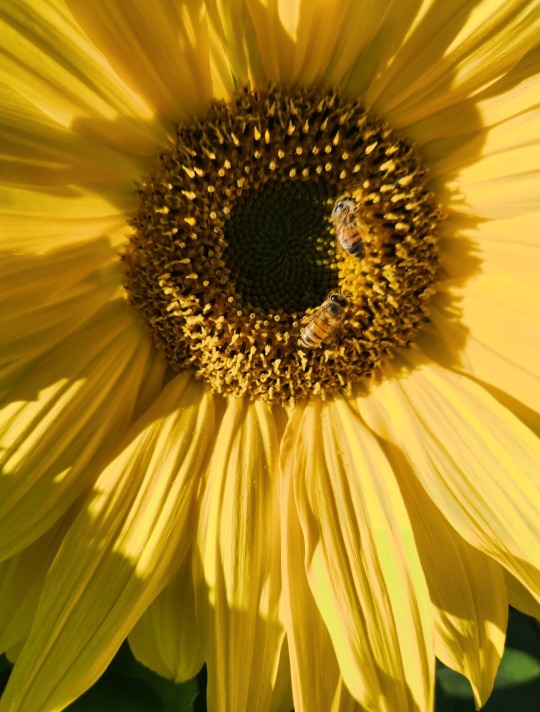
And lots of lovely bees have been visiting. The girls are very friendly for the most part with respect to their space. They were all loading up on pollen :D 🐝🐝
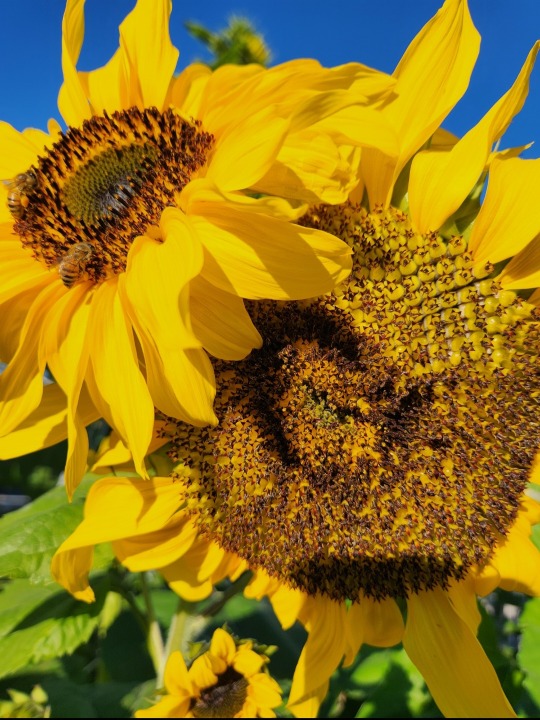
Also many of the sunflowers have multiple heads, or have many branching smaller heads growing in along many of leaves.
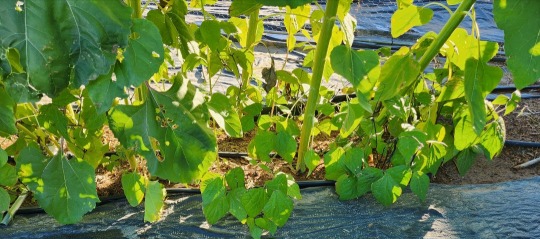
Down below the velour beans are going stronger than I expected in honesty given the sunflower growth and the beans bushing growth. we've gotten 4 harvests now. Each harvest has been around 4-8 ounces.

Nasturtium, I feel okay with starting to harvest the greens soon. Maybe this week or next to make some pesto, breakfast food or salad add ins.

Some of the pumpkin/sunflower+bean row next to the broccoli/nasturtium.
I'm hoping the broccoli will be a little bigger soon so I can harvest some of the leaves for breakfast meals, stirfrys, soup and rice dishes.
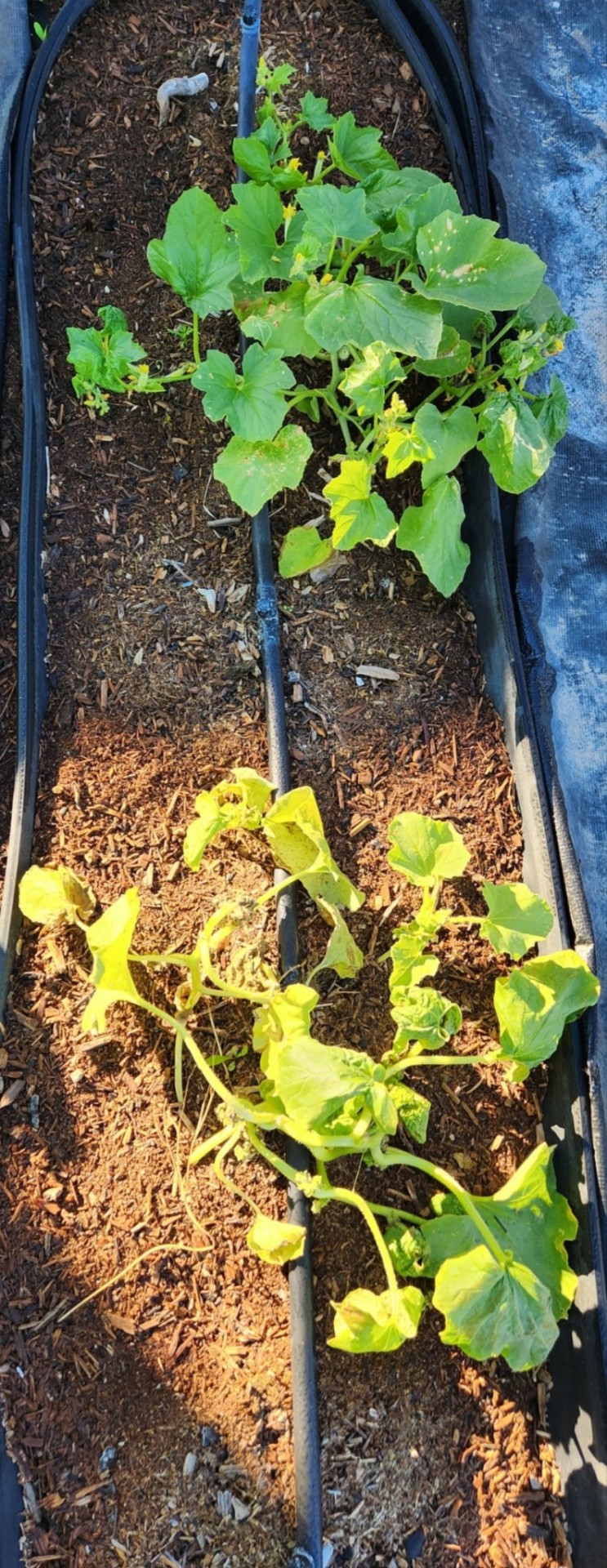
The armenian cucumbers.
Sadly These aren't doing so great, I think where I planted isn't a good winter grow space for them. When I get more soil I'm going to try another spot that has more sun earlier and throughout the day instead of mostly shade. (In the summer/spring they did Great in whichever space.) Once I do I'll be pulling these and planting something else here. Not entirely sure what yet though.
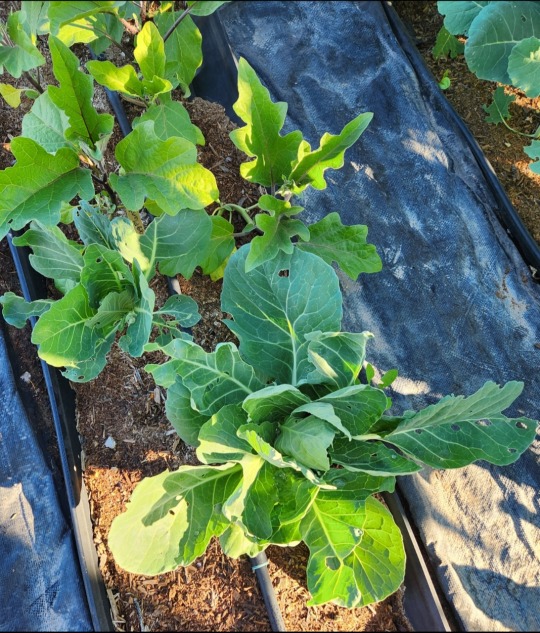
2 cabbages I space filled with. Very excited to see them starting to pick up. 🥬

The eggplants, Very excited there's a full flower now and more flowers look like their coming in!
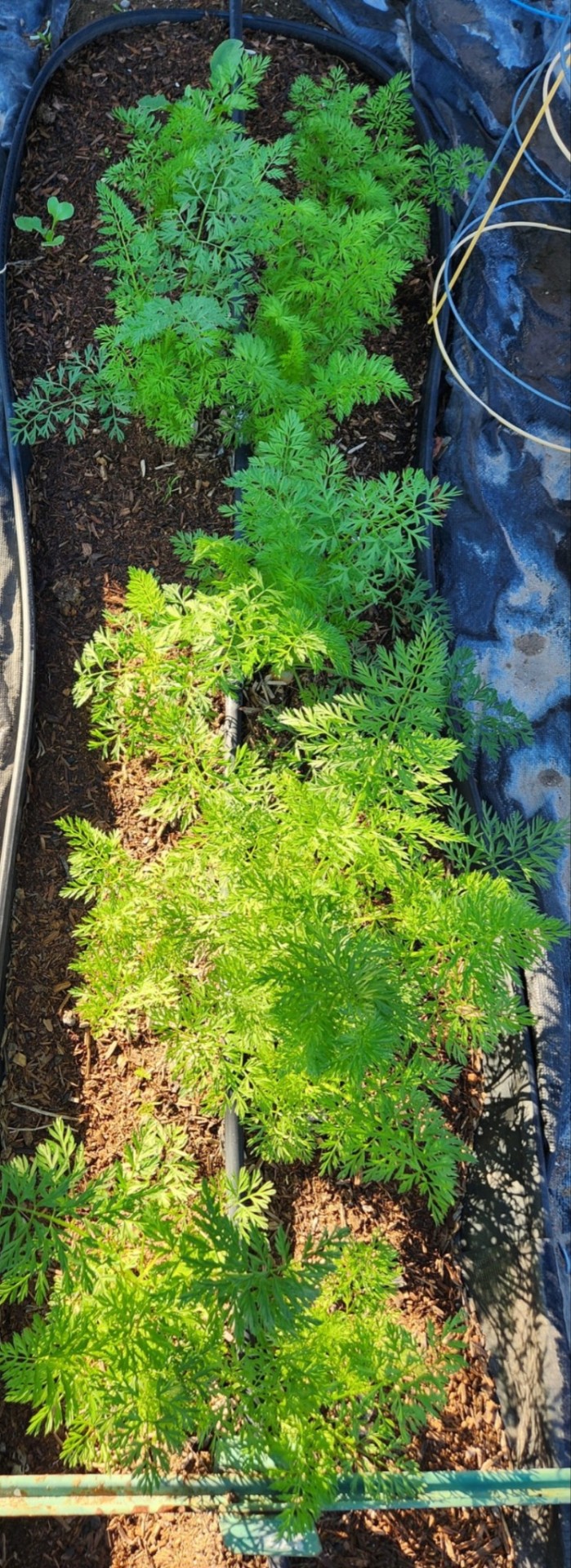
The carrots, a few small radish are still popping up here and there. So I feel like the cornstarch experiment worked but not as well as I'd hoped.
I would use the method again for carrot seeding, but would double the amount of seed in the mix. (I don't mind thinning, the greens and tiny carrots can be used for salad or chopped for omlettes)
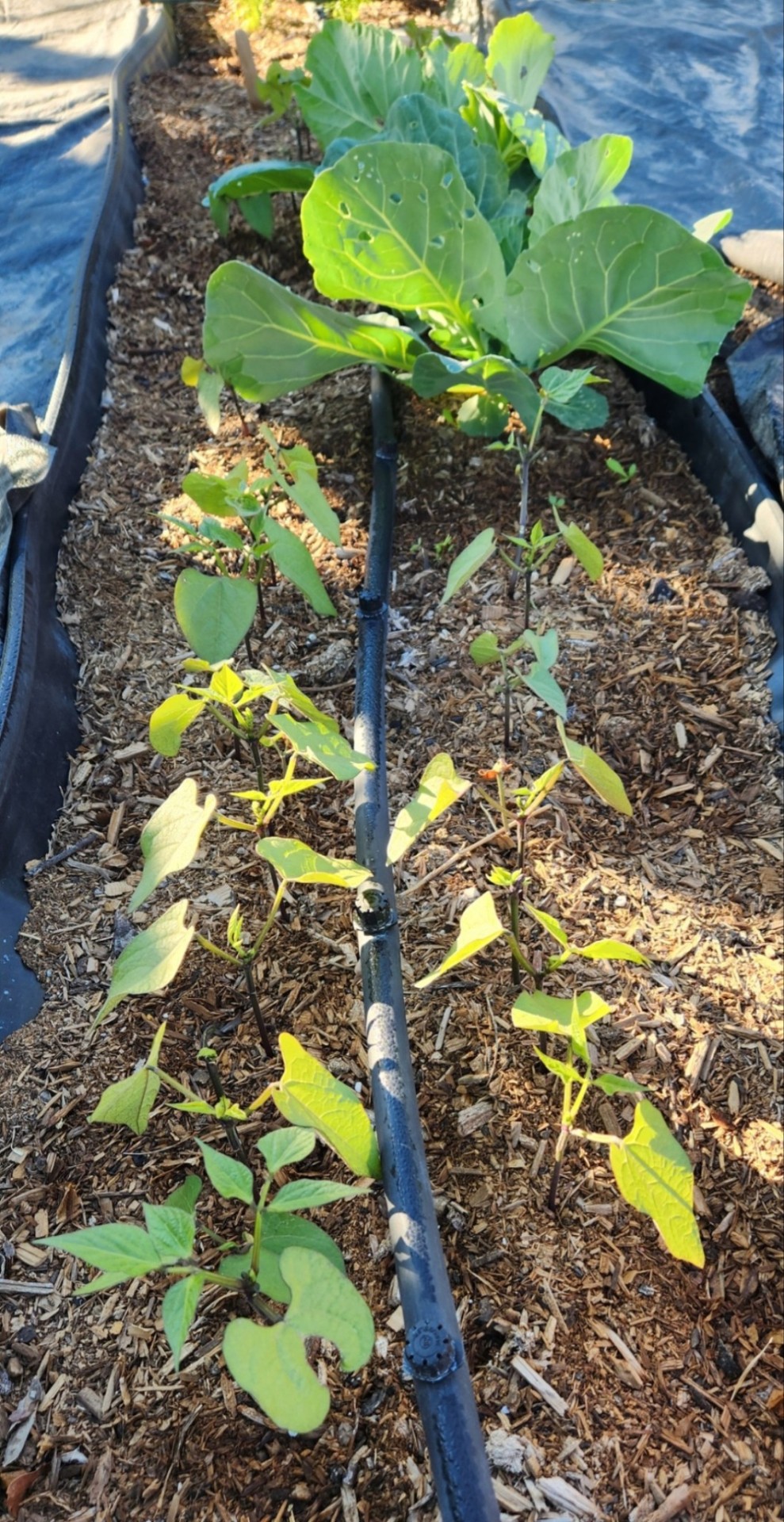
2nd planting (direct seeded) of velour beans, and the few cabbages which survived the initial planting of the row. Somethings having a good munch, ive been checking for the suspects but no luck so far spotting them. I suspect heavily its cabbage loopers as they are a common pest of the area. (I am making chamomile tea to spray on them for now to test if it works.) next grow I may intercrop cabbage and sunflowers or borage. Or perhaps have some movable chamomile pots At the end of the beds to deter them.
This week I'm hoping to get some garden supplies for a few projects And to start breaking down some pallets to build some raised garden beds for a garden expansion.
I am late on starting my tomato and pepper seeds (mostly because I haven't sat down to figure what varieties we want to eat) but a late start is better than none. Thankfully the weather here allows for some tardiness with outdoor grows.
That's it for now 🌱
🌱🌻Happy Homesteading and Gardening🌻🌱
12 5 2023
#homesteading#self sufficient living#thestudentfarmer#studentfarmer#self sufficiency#food#garden#gardening#low waste#broccoli#cabbage#variety bush bean#carrot#nasturtium#sunflower#pumpkin#urban homesteading#urban gardening#urban farming#smalls scale differences#urban sustainability#human right to clean food#right to grow food#food is a human right#right to grow#small scale farming#going green as can be#frugal#ecofriendly#prevent food waste
17 notes
·
View notes
Text
France is testing a pest-repelling fragrance as an alternative to EU-banned neonicotinoids, insecticides harmful to bees and other pollinators, as growers grapple with a lack of alternatives to chemical pesticides. The government authorised in April a biocontrol product – pest control solutions derived from natural sources – based on scented molecules known as kairomones, allowing its use on 500 hectares of sugar beet fields until mid-August. While these methods are gaining traction in the EU, the bloc lacks a common definition for biocontrol. The latest attempt to provide a legal definition was included in the proposal for a Sustainable Use of Pesticides regulation (SUR), a controversial text voted off by the European Parliament last year and withdrawn by the European Commission in February. State support for the biocontrol product, developed by Rennes-based start-up Agriodor, is part of a national plan against the beet yellowing disease, which ravaged France’s sugar beet harvest in 2020. Amid an increased pest risk after a mild winter, the government is ramping up efforts to protect crops from aphids carrying the virus that causes yellowing. “Kairomones are scented molecules that have a repellent effect on aphids and can reduce infestation levels, thereby delaying the need for insecticide treatments,” the French Ministry of Agriculture explained in a press release. Agriodor’s CEO, Alain Thibault, told Euractiv that the product could offer farmers an alternative to bee-killing neonicotinoids, banned in the EU since 2018.
continue reading
#france#beet growers#alternative pesticide#neonicotiniods ban#kairomones trial#aphids#yellowing disease
11 notes
·
View notes
Text
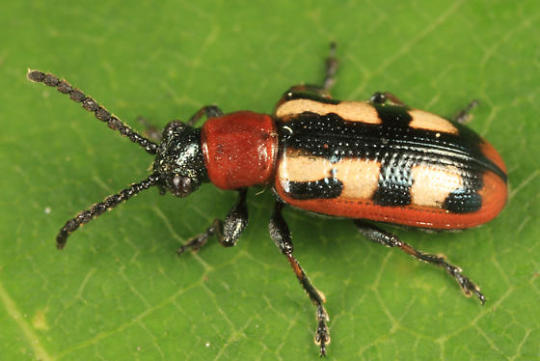


Spare a Moment for the Asparagus Beetle
Crioceris asparagi, more often known as the common asparagus beetle, is a species native to Europe and Asia; is has also been introduced to North America. As the name implies, it is almost exclusively found on asparagus plants, making it a common sight in agricultural fields and grasslands with wild asparagus.
The common asparagus beetle is easy to spot, due to its distinctive markings. Both males and females are black, with a red thorax and a red ring around their wing casings (elytra). Each individual also has three large, white or cream spots on each of their elytra. But for all their flashy markings, C. asparagi are quite small, reaching only 7 mm (0.28 in) in length.
The bright markings of the asparagus beetle are thought to mimic those of another type of stinging beetle, as a way to deter predators. However, this defense is not very effective, as C. asparagi are a popular food for birds including ducks and chickens, as well as larger beetles and wasps. If its bright coloration fails to ward off threats, the beetle will flee to another plant or play dead. For its part, the asparagus beetle only feeds on one thing: asparagus.
Breeding for C. asparagi occurs in April or May and lasts throughout the spring. Males court females by riding on their abdomens and guarding them from other males; females in turn will often attempt to avoid male attention by moving away or kicking them. A female will often mate with several males, and only retains the sperm of the male she prefers. Following copulation, she lays 4-8 eggs on the underside of an asparagus leaf. The eggs can take anywhere from three to twelve days to hatch, and the larvae immediately begin feeding on their host plant. After several weeks, during which time the larvae go through for molting periods or instars, they pupate and emerge as adults. Several generations can occur in a single season. When the weather grows colder, the asparagus beetle burrows into the soil or leaf litter to hibernate through the winter. Most adults only live about a year or so.
Conservation status: The common asparagus beetle has a large, robust population and has not been evaluated by the IUCN. In both its native and introduced range, it is often considered a pest for asparagus farmers.
If you send me proof that you’ve made a donation to UNRWA or another organization benefiting Palestinians– including esim donations– I’ll make art of any animal of your choosing.
Photos
Tom Murray
David Gould
Phil Myers
#common asparagus beetle#Coleoptera#Chrysomelidae#leaf beetles#beetles#insects#arthropods#urban fauna#urban arthropods#grasslands#grassland arthropods#europe#asia#north america#animal facts#biology#zoology#ecology
94 notes
·
View notes
Text


Forest gardens are collections of diverse and useful plant species that are modeled on the structure of a young forest. As a horticultural pattern, forest gardening is found throughout the world, particularly around the tropical rainforest belt. [1] Temperate climate forest gardening is still practiced in parts of China, and there is much to suggest that the forest garden pattern may once have been found throughout the world’s temperate forests, prior to the arrival of agriculture. [2] Practiced in diverse environments, by widely different cultures, the forest garden pattern can vary greatly in detail. The common characteristics by which the general pattern can be recognized are:
Vertical stacking of different species (forest architecture mimicry)
High plant diversity (200 — 400 species per garden is common)
Typically established on small parcels of land (1/4 — 3 acres) [3]
The use of mostly perennial plant species
Producing a diversity of yields to meet a wide range of human needs (geared more toward subsistence than an exchange economy)
Low energy inputs, especially as concerns on-going maintenance
Forest gardens are largely self-fertile and self maintaining (ecosystem mimicry)
Unlike most horticulture and almost all agriculture, which is, by contrast, very two-dimensional, forest gardens are collections of plants arranged both vertically and horizontally. The vertical partitions of space are referred to as “layers,” and the utilization of these layers by the gardener is modeled on the vertical structure of young forests, or forest edges. While tropical gardens sometimes feature up to nine distinct layers, most forest gardens comprise seven layers:
the canopy, consisting of the largest trees in the garden
a sub-canopy of smaller trees and large shrubs
smaller shrubs
herbaceous plants
horizontally spreading plants covering the soil surface
vining plants climbing through all of this
and the “rhizosphere,” the soil layer, from which roots and mushrooms may be harvested and upon which all the other layers depend.
Here in the northeast, a forest garden canopy might comprise walnut, chestnut, hickory, or sugar maple; with a sub-canopy of persimmon, plum, pawpaw, saskatoon, or hazelnut; making their way into the sub-canopy are the vines: grapes, hops, hardy kiwi, groundnut; underneath these in the shrub layer, raspberries, currants, and blueberries; then nutritious and medicinal herbaceous plants and perennial vegetables such as jerusalem artichoke, nettle, milkweed, lovage, or echinacea; and finally, protecting the soil surface, a carpet of strawberries, lingonberries, oregano or mint.
The utilization of vertical space within the forest garden allows for a large number of plant species to be grown in relatively small areas. The number of species found in traditional tropical forest gardens can be truly astonishing: 200 or more plant species, of direct and indirect use to humans — not to mention, birds, insects, and small mammals — is typical on a ¼ acre of forest garden. But even in temperate climates, the species diversity can be very impressive, and 200 — 300 species over an acre or two is not uncommon. The diversity of species in forest gardens makes them very resilient to pest and disease infestations, as these usually only effect a small number of related species at any given time — if a few things fail, there are many more to make up the loss.
In contrast to annual-centric horticulture and agriculture where, every year, seeds are planted and after some months, food can be harvested, the forest garden, with its large diversity of perennial species, makes harvest throughout the year – or, here in the north, throughout the spring, summer, and fall – possible (though even here we begin harvesting tree sap in late winter). The gardener intentionally selects species to provide harvests for as many months of the year as is ecologically possible, and thus, avoids the need to grow any one species in large enough quantities that it may be stored as a primary staple food for the entire year.[4] Harvesting from many species at different times of the year makes the forest gardener’s way a particularly robust and resilient way of growing, food.
Forest gardens provide much more than just food, though. As already mentioned, a characteristic of forest gardens around the world is that they are geared more toward subsistence than an exchange economy. That is not to say that cash crops are never grown in forest gardens, but the gardens are typically planted with such a range of species as to allow the gardener to meet most, if not all, of her needs from her forest garden. There are plants for food, yes, but also plants for medicine, for fuel, for fiber, for dye, for building, woodworking and basketry materials, and also plants whose place may be primarily in providing ecosystem functions, such as nitrogen fixation, or attracting certain types of insects, necessary to the overall health of the garden.
Tropical forest gardens tend to be planted on small plots of land, often only ¼ to ½ acre in size. In the tropics, as there is a year-round growing season with more intense sunlight, and many more shade adapted plants, forest gardeners are able to plant very large numbers of species in small areas. While in the tropics, a ¼ acre of forest garden may be sufficient for a household,[5] in temperate regions with less sun and fewer plants that remain productive in shade, more space is required to allow for wider tree spacing, which, in turn, allows more light to reach the understory, keeping the plants there productive. Temperate climate forest gardens, geared towards the needs of a single household tend more towards 1 to 2 acres in size.
In forest bioregions, the land, if left alone following disturbance, will quickly move through successive stages of development until it is again clothed in forest: the forces of nature are always tending toward a forest ecosystem. If working in opposition to this natural tendency, hefty energy inputs required to maintain the land in a non-forested state, and the further from forest one goes, the higher the. requirements become. Thus, agriculture – keeping a field where there would otherwise be forest, dependent almost exclusively on annual plant species where there would otherwise be perennial species – is the most energy-intensive way of meeting our needs: it requires the most labor (or the most fossil fuels).
The forest garden works with the natural tendency of the land. In some forms of forest gardening, the garden literally hitches a ride, as the site is cleared, planted, and then let revert to forest at its natural rate, a new garden site being opened elsewhere as the forest canopy closes.[6] In many forms of forest gardening, reversion to mature forest is arrested prior to full canopy closure, largely through the selective harvesting of trees to re-open the canopy.
In the forest garden, the major energy input comes in the establishment of the garden – the clearing and preparation of the garden site and the planting of the garden. As the planting is of mostly perennial plants, the planting only needs to be done once, not every year (though plantings are typically added to or changed, and replacements of varieties are made – after all, it is gardening, and gardeners are potterers). Clearing and preparing of the site, in sedentary models of forest gardening, can also be done but once. In shifting models, typically found in large tropical forests, the clearing and site preparation may be done as often as every five years. Following establishment, the main activity of the forest gardener (or forage gardener) is harvesting.
As the forest garden closely approximates a stage of natural forest succession, it can, like the young forest it mimics, be self-fertile and thus largely self-maintaining. The normal processes that fertilize the forest, such as the decomposition of woody organic matter and leaf litter by fungi, insects, and soil organisms, are also present in the forest garden. And significant quantities of bird, insect, and animal manure are to be found, as they are in young forests. The use of many leguminous nitrogen-fixing species by forest gardeners — to improve soil conditions for the surrounding plants — is a mimicry of the ecosystem function of pioneer species. Pioneer plants, present in the early and mid stages of forest succession, enrich the soil and nurse the young trees that will later become the canopy of the mature forest, protecting them from wind and animal browse.
Like a forest, yet unlike agriculture, the underground space of the forest garden is partitioned as well. In monocultures, the plant roots are all down at roughly the same depth in the soil and looking for exactly the same minerals and nutrients as their neighbors. In the highly diverse perennial polycultures of forest gardens, different soil depths are occupied and the precise needs of the plants (being different species) differ, thus plants may be grown in close proximity to each other without resulting in soil depletion and excessive competition between plants.
It took the monocultural minds of Westerners a good while to recognize that the chaotic mess of vegetation surrounding homes and village sites in such diverse places as Sri Lanka, Tanzania, or southern Mexico was, in fact, an ecologically-sophisticated way of meeting most of the essential needs of the gardeners. Yet agroforestry, the agricultural approach to three-dimensional perennial polycultures that came into being in the early to mid-twentieth century – large scale, machine-harvestable, market-oriented – when it recognizes forest gardening at all, sees it only as a distant and difficult relative.
The revival of forest gardening in the west is due largely to the experiments of Robert Hart, a Tolstoyan anarchist, author, and small-hold farmer. In the 1970’s, Hart developed an interest in agroforestry — in particular, the system of “three dimensional farming” developed in the l950’s by Toyohiko Kagawa — and began his own experiments with (what was to later be called) forest gardening, on 1/8th of an acre of old orchard. On this tiny piece of land, Hart developed a productive garden (yielding food and basketry materials mainly), far more ecologically complex than any form of agroforestry then being practiced, and far closer to the chaotic tropical forest gardens that agroforestry sought to simplify. This is hardly surprising, as agroforestry is focused on production for a market-economy, whereas Hart sought a decentralized and de-industrialized society where households and villages would be largely sell sufficient. The great irony here is that Hart was conducting his experiments in the Welsh border lands of Shropshire, England, the precise place where the industrial revolution began. Hart’s vision of the forest garden was one of raising the self-sufficiency of households to facilitate economic down-sizing and a return to highly localized economic activity, of creating sites of practical education for children in the life skills of feeding and sheltering themselves through co-operation with diverse species in living systems, and of a means of re-greening the forest environments that agriculture and urbanism had denuded.
Robert Hart’s work has inspired a subsequent generation of neo-forest gardeners, particularly in the United Kingdom, continental Europe, the United States, Australia, and New Zealand. While Hart’s forest gardening idea is often thought to be synonymous with permaculture, it was pioneered independently of permaculture,[7] and if the practice has been widely adopted by permaculturalists, it is because, in many ways, it could be considered the quintessential permaculture technique of production: an ecologically regenerative/benign, low-labor, solar-powered, self-maintaining, resilient production system that is directed toward household and community self-sufficiency. While there may be some problems with the way forest gardening has been incorporated into permaculture practice, such as a focus almost solely on the production of food, rather than the full range of things needed for a subsistence life, it should nevertheless be acknowledged that many of the techniques used in temperate climate forest gardening by neo-forest gardeners, particularly those of design and site preparation prior to the establishment of a garden, are the fruit of decades of research, experimentation, teaching, and networking by permaculture practitioners.
Hart’s pioneering work has inspired not only some spectacular gardens but also some very good texts on forest garden theory and practice. The most notable of these are Marlin Crawford’s Creating a Forest Garden, and the two-volume set, Edible Forest Gardens, by Dave Jacke and Eric Toensmeier. The former is, in my opinion, the better introductory text as it clearly lays out the basics of temperate climate forest garden theory, design, and implementation, and it is authored by the person who has created what is, by popular consensus amongst forest gardeners, the finest example of a temperate climate forest garden in the western hemisphere. But once hooked and eager to take up the art of forest gardening, the Jacke and Toensmeier texts become indispensable, particularly if you live in the northeastern United States. the region where these two forest gardeners reside and upon which the volumes are focused. These are encyclopedic tomes: the first volume is a thorough exploration of forest ecosystem theory, while the second contains detailed explanations of site assessment and design processes, forest garden implementation and maintenance, and includes a near-exhaustive list of useful perennial plants for temperate climates. There is so much information in these two volumes that I fear, for the uninitiated, they may make forest gardening appear ridiculously complicated, which it is not. Forest gardens, as close mimics of natural forests, are complicated beyond our understanding, and therefore, the gardener need not attempt to understand everything as the scientist seeks to, but rather, through observation and participation in the evolution of this ecosystem in miniature, can develop and depend upon the craft and intuition usually associated with the artist, or master gardener. There are a few fundamental ideas and techniques that need to be thoroughly grasped before planting a forest garden, but only a few. On the other hand, to become a master forest gardener will likely take a lifetime.
Finally, there is also Robert Hart’s Forest Gardening, not a how-to manual so much as a poetic exploration of Hart’s vision of the forest garden and how he came to it. As the focus of neo-forest gardeners has largely been on technique, it is good to remind ourselves that, at least as Hart saw it, the real fruits of the· forest garden were self-sufficiency and autonomy.
Works Cited
Anderson, M. Kat:
2005 Tending the Wild: Native American knowledge and management of California’s natural resources. Berkeley: University of California Press.
Crawford, Martin:
2010 Creating a Forest Garden: Working with nature to grow edible crops. Totnes: Green Books.
Hart, Robert:
1996 Forest Gardening. White River Junction, VT: Chelsea Green.
Jacke, Dave and Eric Toensmeier:
2005a Edible Forest Gardens, Vol. One: Ecological vision and theory for temperate climate permaculture. White River Junction, VT: Chelsea Green.
2005b Edible Forest Gardens, Vol. Two: Ecological design and practice for temperate climate permaculture. White River Junction, VT: Chelsea Green.
Lawton, Geoff:
2008 Personal communication.
Workman, Dion:
2011 — ‘Natural Farming in the Philippines: Traditional farming systems and local efforts to save them.’ Unpublished manuscript, originally appearing on the now defunct natural farming website, Terraquaculture.
2013 — ‘Jomon Horticulture: “Incipient agriculture” or forest gardening?’ Lecture given May 5, 2013 at Shikigami forest garden, Japan.
[1] Forest Gardening is still practiced in Sri Lanka, India, Indonesia, the Philippines, China, Vietnam, Tanzania, Nigeria, central America, and the Amazon. (Hart; Crawford; Lawton; Workman)
[2] This claim, based upon a slightly broader definition of forest gardening than I have given in this article, includes practices that might better be called, as Dave Jacke has, “gardening the forest,” or, as M. Kat Anderson has called them, “tending the wild.” Examples of this more extensive approach to “forest gardening,” include the Jomon, indigenous to the Japanese archipelago (Workman 2013), indigenous peoples of the eastern forest bioregion of North America (Jacke 2005a: 14), and the indigenous peoples of California (Anderson). In Europe, traditional coppice practices and the cultivation of hedgerows comprising many useful forest-edge species are certainly forms of “agroforestry,” but may also suggest older practices of tending the wild.
[3] Forest gardens are “over-yielding” systems, meaning that multiple harvests of different crops are possible from the same piece of land. The implication of this is that, while forest gardens cannot produce yields of a single crop comparable to agriculture, they can produce overall yields, from a given piece of land, far higher than that achieved with agricultural techniques. Thus, when geared toward subsistence, forest gardens need only take up relatively small areas of land.
[4] While in the tropics it may not he necessary to store food for any length of time, in temperate climates, particularly the further north or south you go, it is. Thus, temperate climate · forest gardeners do generally grow crops suitable for long term storage — nuts, in particular, but also fruits, seeds and tubers — however, they can do this by spreading the quantities needed, or desired, across as large a number of species as possible. This approach creates resiliency against crop failure in the forest garden.
[5] It should be noted that tropical forest gardeners often also have access to much larger forest areas and so it should not be thought that everything is corning from the forest garden. Many wild foods, medicines, materials, and particularly firewood will often be gathered from outside the forest garden.
[6] This practice, often derogatorily referred to as slash-and-burn agriculture, when viewed in the light of what ecologists have called the patch dynamic theory of forest succession (Jacke 2005 : 268) — in part, the idea that a forest, rather than taking a single, linear path towards a static, climax state, is rather continuously cycling through all stages of succession across different parts of the forest — may in fact be a very sensitive mimicry of natural forest disturbance patterns. Naturally, such disturbances might occur when a large tree falls in the forest, taking a good number of surrounding trees with it, some uprooting and disturbing the soil, leaving a clearing where primary and secondary stages of forest growth will now manifest. Other natural occurrences such us windstorms and wild fires can also create such patches. The size of the patch that can be created by a large tree falling in a forest is not dissimilar to the size of many shifting forest gardens.
[7] As practitioners view permaculture as a “toolbox” of techniques, as well as a design system, they have the tendency to label anything that resembles it, or is useful to it, as “permaculture.” While this infuriates some horticultural innovators who do not want to be thought of as permaculturalists, Robert Hart seems to have been only too happy to be included in the permaculture fold.
#forest gardening#a forest garden primer#solarpunk#food sovereignty#sylvia wilde#community building#practical anarchy#practical anarchism#anarchist society#practical#revolution#anarchism#daily posts#communism#anti capitalist#anti capitalism#late stage capitalism#organization#grassroots#grass roots#anarchists#libraries#leftism#social issues#economy#economics#climate change#climate crisis#climate#ecology
4 notes
·
View notes